#we need more south asian queer representation
Text
You know it's gonna have astronomical levels of *angst* when opening chapters start like this😌
I have drawn these two before here . But not in this specific scene, I'd love to one day🥹❤️

#priya x malini#the jasmine throne#the oleander sword#lgbtqia#sapphic books#i love these two#love lesbians in south asian stories#we need more south asian queer representation#everybody say thanks to#tasha suri#for writing#warrior lesbians#warrior x schemer#book recs#new read#current read#burning kingdoms#burning kingdoms trilogy
49 notes
·
View notes
Text
Okay so it is 1:20am and I should be going to bed but instead I’m gonna contribute to the endless conversation about how fucking fantastic the representation in hades is
Like as a queer person of colour I just get this massive wave of joy when I see my favourite characters look like me. Like I often forget how underrepresented people like me are in the media until I actually see it and it changes me fundamentally lol
Orpheus and eurydice have afros LIKE ME! Athena, ares, zeus and patroclus are black LIKE ME! Dusa is asexual and trans LIKE ME! Chaos is nonbinary LIKE ME! There’s also east/south asian representation via hermes and dionysus. And it’s all portrayed so casually, it’s not there to tick off a diversity box. Supergiant actually put thought and care into these designs and stories and that’s just so amazing to see especially within the gaming industry
To quote the creative director of supergiant from this article (which you should DEFINITELY check out)
“As we discussed and researched the Olympians from canon sources, something stood out that in retrospect was obvious: They’re called the Greek gods because they were worshiped in ancient Greece, not because they themselves are ethnically Greek.”
“Zeus rules all the heavens, not just the airspace over Greece, Poseidon rules all the sea and land. They sprang from the Titans, who sprang from primordial Chaos, the source of all creation. So it stands to reason that the gods represent all the people of the world, at least indirectly.”
Not only is it great to see sexuality represented but it’s represented well. Like everyone just knows zag is bi, there’s no coming out story and there’s no threat of discrimination. It’s just like yeah this is zagreus he likes men and women and pissing off his dad. When zag asks dusa about her body and she declines to talk about it he apologizes saying that he didn’t know any better. Everything is treated with so much respect it’s just so great
Again, my heart feels so full when I see portrayals like this. I looked in the mirror the other day and made a joke about how my hair looked like orpheus’ and that honestly made me so happy and giddy it was a little embarrassing lol
Anyways, I think I had more to say but I’m tired and my brain is foggy but I needed to rant about this because otherwise I might’ve exploded lmao
I just love this game so much
184 notes
·
View notes
Text
Tell Me How You Really Feel by Aminah Mae Safi - Book Review
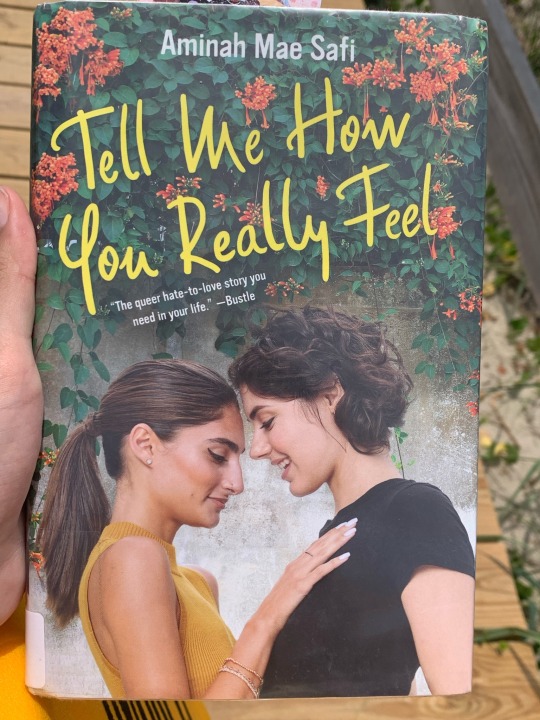
9.5/10 ⭐️⭐️⭐️⭐️🌟
TWs: car accident, cursing, sexism, panic attacks, abandonment
(TWs are ranked in order of severity, please take them seriously!)
Summary
“The first time Sana Khan asked out a girl-Rachel Recht--it went so badly that she never did it again. Rachel is a film buff and aspiring director, and she's seen Carrie enough times to learn you can never trust cheerleaders (and beautiful people). Rachel was furious that Sana tried to prank her by asking her on a date.
But when it comes time for Rachel to cast her senior project, she realizes that there's no more perfect lead than Sana--the girl she's sneered at in the halls for the past three years. And poor Sana--she says yes. She never did really get over that first crush, even if Rachel can barely stand to be in the same room as her.
Told in alternative viewpoints and set against the backdrop of Los Angeles in the springtime, when the rainy season rolls in and the Santa Ana's can still blow--these two girls are about to learn that in the city of dreams, anything is possible--even love.”
TL;DR Tell Me How You Really Feel is an ode to romantic comedies, following two girls on opposite sides of the social scale as they work together to make a movie and try very hard not to fall in love. Cheerleader meets film nerd, enemies to lovers.

I found this book through one of those tik tok videos where someone is flinging books off a pile at light speed under a caption “queer SA (South Asian) books you need to read”. I absolutely love those videos, even though they test my screenshotting abilities.
It’s been a while since I updated this blog(?) and that’s because I’ve been very busy finishing out the school year and reading every gay book I could get my hands on over the course of pride month. I will be posting reviews of those books soon, but in a quick review so far this month I’ve read:
• Last Night At The Telegraph Club
• Unearthed (graphic novel)
• Café con Leche
• Eighty Days (graphic novel)
• Tell Me How You Really Feel (this review!)
• The Raven Cycle (yes all 4 books, no I will not be reviewing)
Honorable mention: All 50 episodes of The Untamed (SUCH a good cdrama) & Season 1 of Stranger Things
I’ve realized over the course of this book binge that I prefer my enemies to lovers to have good reasoning - or at least understandable reasoning on both sides. My favorite part is seeing how that can morph into love without either realizing until it’s too late *cue evil laughter*
Tell Me How You Really Feel does that perfectly. I especially loved how it was written - the characters were flawed, raw and dynamic, and the writing style reminded me of books by Nicola Yoon (The Sun is Also a Star, Everything Everything). The romance isn’t necessarily the focus - it’s shoved in on the shelf along with everything else happening in the characters lives. The story simply starts (ish) and ends with the life of their romance within that.
And because this is a gay high school romance between a cheerleader and a film nerd, of course there are a million movie references, from Pakeezah to Pretty in Pink.

Meena Kumari 😩🧎🏽♀️
But real quick, let’s talk
Representation
Sana Khan and Rachel Recht, the main characters, are both into women. Although their sexualities aren’t explicitly stated, this part is made very clear.
Sana is desi, and Persian and Indian if I remember correctly? Her family is very mixed and has a lot of languages (Bengali, Urdu, Arabic, Persian, French, etc). She is second-gen American, while I’m pretty sure Rachel is first-gen (at least on her mom’s side).
Rachel is Mexican and Jewish, and her family consists of just her and her father (and their larger community) in comparison to Sana’s many cousins and aunties/uncles. Her full name is Rachel Consuela Recht, which I’m guessing is to show her mixed cultures.
For Sana I can somewhat call this an own voices review on representation, but please keep in mind the Indian (and larger desi community) is not a monolith & we won’t all agree on my own interpretation.
What I really liked about representation for Sana and her family was it is very women-centric. Her grandmother, Mamani, is very clearly the matriarch, and Farrah, Sana’s mom, is a single mother working in the film industry. In western literature desi culture is typically portrayed as oppressing women, especially in Muslim households, but this stereotype is flipped on its head by Sana’s family. It also showed how within a religion certain family members can be more religious than others - Sana & her Mamani are more religious (praying regularly, not drinking, etc) while Farrah is less so - and there’s no negative connotation on it.
Rachel and Sana both engage in religious holidays over the course of the book (Norwuz for Sana, Passover for Rachel). Since I’m neither Muslim or Jewish, it was interesting to learn more about the holidays and how they’re celebrated.
Single parenting rep (Rachel raised by her dad, Sana raised by her mom) was also really good. As someone being raised by a single mom & at one point a single dad, the struggle is portrayed really well.
Finally, I love that Sana fills the character of pretty perfect Gilmore-girls-esque cheerleader. Brown women don’t often get to be portrayed as lovely and soft and also raw and real at the same time. It really hit my heart 💗 Sana’s features are seen as beautiful by everyone around her - like a commonly accepted fact. She’s the official “pretty girl” of her school - and so much more beneath that.
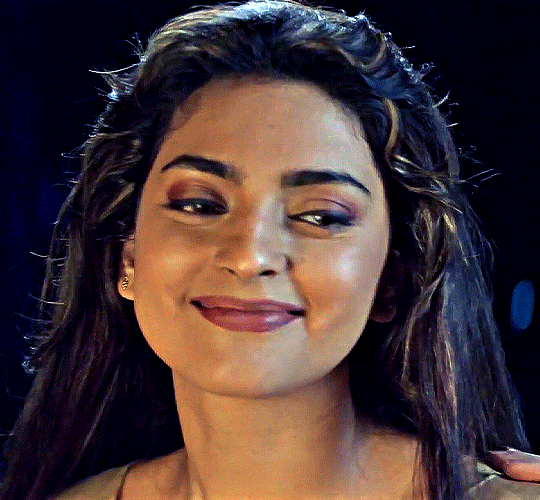
What I Loved:
Aside from the good rep, the way the book is written is just ✨ poetic ✨
“Sana smiled, and suddenly Rachel understood every stupid love poem comparing the beloved to the sun.”
HOW DO I RECOVER??
Mainly though, I think this book came at the right time for me. Sana’s situation was really relatable to me, and her storyline actually helped me figure out some stuff in my own life (no spoilers!)
If you’re worried about the future, or planning to become a doctor or lawyer - read this book.
I’m also a sucker for big movie style gestures so this was a plus. I could see how the book was going to end generally way before the end, and that made it more of a comfort read than an “intellectual” read. I loved the character development as well - some serious words of wisdom in there!
As someone who wants to go to college in LA, and can’t afford to visit, this is as close as it gets to seeing what life there is like for me 😂 I’m curious to see what those Santa Anas feel like!

Why I couldn’t give it a 10:
I wasn’t the biggest fan of Rachel’s character to be honest. She hated Sana so much at the beginning, for something that had happened in their freshman year (the story takes place in their senior year). I could understand animosity, but it was another level. It made me think Rachel had anger issues - she seemed really self pitying and insecure. Which would have been fine - I’m all for character development - if she had realized that. But Rachel never seemed to come to terms with the fact that she had treated Sana like sh*t at every turn for nearly 4 years. It’s not that they don’t fall in love (this is a love story) but she doesn’t really feel remorseful for how she acted.
On set, when she’s directing the crew, the way she treated them reminded me of Michael Scott from the Office 😭
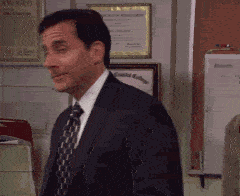
I also wish there had been more focus on the other characters in the book. Farrah, Sana’s mom, and Daniel, Rachel’s dad, kind of felt like glorified plot devices, especially near the end. Same goes for Diesel, Sana’s so-called best friend. We don’t actually see a lot of their relationship aside from Diesel giving her rides from school and then playing video games with her. In the end, his purpose was also a little plot device-y, a little serving the main ship, etc.
I liked that Diesel subverted the dumb insensitive jock trope, but I would have loved to see more of him and Maddie (another cheerleader)!
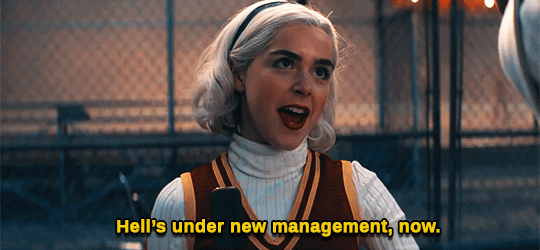
^unrelated but I love this scene (very scary cheerleader)
Overall, the book was a satisfying beach read (as in, I literally read it on the beach). Feel good, decent character development (on Sana’s part), and it gave me something I’d really been searching for: an enemies to lovers story between queer women of color in high school. Like babe- this is my niche!!

And yes, I cried at the end.
I sincerely recommend to fans of:
The Sun is Also A Star
Everything Everything
Movies (if you’re a movie nerd, you’re going to get wayy more of these references than I did)
But I’m A Cheerleader (movie)
Sense 8 (show) especially if you like the wlw couple
Most of my reviews for this month are going to be LGBTQ+ stories between PoC 🏳️🌈 so stay tuned!
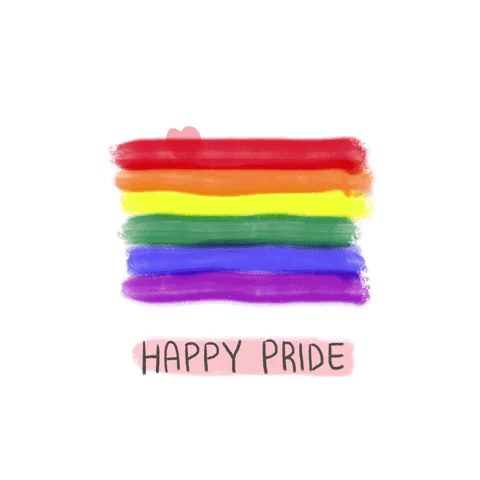
#book review#bipocbookstagram#poc books#booklr#diverse reads#lgbtq books#tell me how you really feel#aminah mae safi#lets go lesbians#everything everything#the sun is also a star#queer enemies to lovers#enemiestolovers#cheerleader#film nerd#happy pride 🌈#queer bipoc#queer desi
29 notes
·
View notes
Text
july 21, 2022
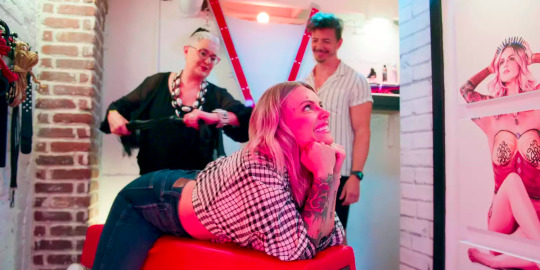
After watching "How to Build a Sex room" on Netflix I am thinking about "representation" and healing generational trauma.
First off, doesn't it make you angry? The scamming fuckery of Netflix and Disney and Marvel. These huge corporations getting hold of diverse talent and deploying a diverse rainbow of faces and stories while nothing about our material conditions changes. The subaltern yammering away about family trauma on the big screen, a new song and dance show: healing is depicted, we cry while watching, we discuss with our friends, do we start to believe this is enough?
There is plenty to say about "Ms. Marvel" and "Everything Everywhere All At Once" and "Seeing Red" and "Encanto" but we can all agree that they are all incredibly focused on family and familial relationships. Can we at all examine the nuclear family critically? Disney, Marvel, and Netflix will never. Fuck the nuclear family. Ive been over it; read a book; think about it for 2 seconds.
There are multiple shows about South Asian/Desi weddings and matchmaking. There is not a single mention of caste, ever; not in "Meet the Patels," "Love is Blind," or "Indian Matchmaking." There is the actual-reality obsession with weddings, marriage, heterosexuality, and patriarchy that is so overwhelms our everyday conversations and social calendars. There is only dating and wedding and sexless marriage and competitive child rearing in the service of the status quo, nothing a corporate TV or movie will ever, ever disrupt.
"How to Build a Sex Room," like almost all home renovation or HGTV style stuff completely ignores class or any type of systemic oppression. It presents a big budget world of home owners who value sex, love, pleasure, and connection. Most episodes are about married heterosexual couples, but there is a sprinkle of queer people, one episode with a "poly fam" group of 9, and a finale episode featuring a single woman. This lone participant is a white woman in her 50s, who got a divorce after about 20 years of marriage. She opens up about how unsatisfying that marriage was, and how committed she is to her vision of a more loving, sexy, affirming future.
Her story is presented in a 1 hour television episode. It's her reality, it's not my reality or anyone else's. Images can come alive, yes, but you have to initiate the conversation. Maybe I will acquire a spanking bench like I saw on the show. I'm definitely overdue for a new vibrator. I watch TV, I listen to music, I believe strongly in the power of imitation. The moment you sing a song, it's yours. You created it, it's your own output. In stark contrast, corporate "representation" will always prioritize and encourage consumption.
I don't need to see a Desi person exploring their kinks in season 2 of "How to Build a Sex Room," but I would like to meet more who do. And I think if a member of the subaltern would be willing to be so vulnerable and sex positive on a reality TV show, I would celebrate and imitate them.
1 note
·
View note
Text
Why is Queer Affirmative Counselling important?

The world has come a long way in discussing and accepting LGBTQIA+ people in the past few years. From living under a cloak of invisibility where the pain, grief, concerns, and voices of queer people were not only brushed off, but more often than not silenced by force, to the present day where we have made strides in conducting open discussions regarding issues of gender sexual minority (GSM) community and have some positive media representation. To some extent, we have managed to achieve small victories in the matter. But the distance between equality for LGBTQIA+ people and their present-day realities still remains a huge gaping hole.
LGBTQIA+ individuals are often subjected to bullying, discrimination, hostility, and physical and verbal abuse based on their sexual orientation and gender expression. Queer people either live in constant fear of dealing with the hostility and discrimination based on their gender and sexual identity, or shun their authenticity and stay in the closet to feel a sense of safety. Both of these options are equally detrimental to a queer person’s mental health. Even as kids, growing up in a world where heteronormative and cis-gendered identities have been the norm, many queer children have understandably internalized the idea that their way of loving and expressing themselves is different or outside the (hetero) norm. This creates a sense of shame or ‘otherness’ in queer children, which in turn can lead to toxic shame regarding their own gender expression and sexual identity. The constant barrage of abuse, hostility, discrimination, a lack of support from friends, peers, and families, and incessant reminders that something is ‘wrong’ with them can leave queer people with a deep sense of loneliness and hopelessness. As a consequence of this, they may develop many psychological issues such as but not limited to fear of violence, feelings of abandonment by loved ones, substance abuse, experiences of depression, anxiety, PTSD, and in some extreme cases self-harm.
To help LGBTQIA+ people deal with the multitude of problems they face in their everyday lives, they need to be able to access and receive the mental health care that they need and deserve. This can only be done through queer affirmative counselling. By definition, queer affirmative therapy is a psychotherapeutic practice that takes on a positive view of LGBTQIA+ individuals, their identities, and their relationships. LGBTQ counselling not only addresses the impact of homophobia, transphobia, and heteronormativity on LGBTQIA+ clients, but also takes into account the needs of marginalized people by adopting an intersectional approach. Queer-affirmative counselors work to validate and advocate for those with minority identities surrounding gender and sexual expression and understand how socio-political contexts play a huge role in the diminishing mental health of queer people.
The root of queer affirmative therapy lies in affirmative psychotherapy. The term ‘affirmative’ signifies how this practice affirms and honors the experiences of people, especially in the Indian and South Asian context, where queer people are still marginalized socially and medically. Affirmation forms a very important part of queer affirmative therapy, as the role of the therapist is to affirm the experiences of their clients without prescribing them a cure or pushing them in a certain direction. LGBTQIA+ counselling considers the psycho-social reality of a client as a part of their affirmation process. Even if the therapists don't understand their lived realities and contexts, they still strive to affirm the experiences of marginalization faced by LGBTQIA+ individuals. Queer-affirmative space is detached from the power dynamics that exist between a practitioner and a client, which is the standard norm in western modes of practice. In queer-affirmative counselling, the idea of neutrality of a therapist is questioned as issues of discrimination and marginalization are inherently political. Hence, queer-affirmative therapists are trained to immerse themselves in the self-work of identifying transphobia and homophobia in their thought processes. LGBTQ counselors have a deep understanding of issues pertaining to LGBTQIA+ individuals and are therefore able to recognize that all spaces, including the therapy room, are political spaces.
In a world where the lives of LGBTQIA+ individuals are constantly surrounded by turmoil and challenges at every step of the way, Queer-affirmative counselling offers a space of trust and safety where queer people can be their true selves and express themselves authentically without any fear of judgment or backlash. It is imperative that counselors are able to create a safe space for queer individuals where they can tackle their mental-health struggles and feel understood and supported.
0 notes
Text
5/24 Pop Culture
I have a ton of thoughts on this! This: https://www.tiktok.com/@andrew.callaghan/video/7056525255120014639?lang=en is a tik tok/youtube video that got huge last year. It sparked a tik tok trend and speaks exactly to what we're talking about today, the objectification of Latina women. Context surrounding the video, Andrew Callaghan is an independent reporter/journalist who creates videos on Youtube and Patreon under the handle Channel 5 News (formerly, All Gas No Brakes). Andrew has been lauded for doing some incredible work with documenting the BLM protests in 2020, the Chauvin trial verdict, the January 6th riots, etc. The work he has done is incredible. He really captures what it felt like in those moments. However, he also platforms the most insane right-wing takes ever. He is very clearly against these types of beliefs, but nonetheless provides a platform for them. And if there's one thing that is true about art, it is that the creator loses control of the art the moment it enters the public sphere. So oftentimes Andrew's long-form interviews, which were done in good faith, will get clipped and take on a life and trend of their own. This happened with the above tik tok and it gets at something that I've been feeling recently. I feel like fetishization is now being disguised as acceptance. This language is going to be awkward but I'm not sure how else to write it, but as it has become more acceptable to date outside of your race, I think many white people have done so and have seen themselves as a white savior. We saw this with enlisted men marrying East and South Asian women during the Vietnam war. We see this with the fetishization of Filipina women. We see this with the fetishization of kpop artists. And while there has long been a white savior complex in American men, I think the important distinction is that while I was growing up I heard J.Lo called exotic and different in derogatory ways. Now, I feel like people will objectify non-white women and try to disguise it as acceptance and being woke. As if being a misogynist to a larger array of women makes you progressive.
I most recently butted up against the fetishization of specifically Latina women in Chris DiStefano's new Netflix special "Speshy Weshy" I turned the special off after about ten minutes when he spent those first ten minutes of the show talking about how he (a white man) was now Puerto Rican because his wife and children are Puerto Rican. He kept going on about how he was a proud Puerto Rican man and blah blah blah. The vibe was that he objectified his wife. By marrying her, he now had access to this new world of cultural experiences that he felt entitled to.
I thought the readings paired well with each other. I didn't know a lot about Frida Kahlo other than that she was queer. The two readings we had on her lead me to an debate that I've been having with myself for a while.... which is that we firstly need to unwhitewash and unwater-down historical figures, understand them for the political people that they were, and celebrate that. On the other hand, some of the best representation we have is problematic. Ellen, great for lesbian representation, also hangs out with George Bush and is famously abusive to her staff. Ru Paul, made drag more mainstream and accessible, also is transphobic and really into fracking. Caitlyn Jenner, great that we have a famous trans person to initiate conversations, also got away with manslaughter and actively works against the trans community in favor of siding with the rich. All of this is to say that the representation we have is complicated. I am of course grateful to everyone above for being themselves publicly, that can be enough, but we also have to understand that rich people are first and foremost rich, they may also be trans and queer and black and brown, but they are rich above all else and so it's never really full and complete representation. I of course put none of this baggage on J. Lo because I simply do not know enough about her life based on one day's worth of readings. Representation matters, life is messy, I'm proud of those who stand up in the face of objectification even if they are super rich and far removed from my own experience with queerness.
I think that objectification can be empowerment if that is what you're looking for. If objectifying yourself makes you feel good and it is done on your terms and with your boundaries then go for it. There is liberation in dressing outside of the norm and if you are doing it for yourself and it makes you feel powerful, then go for it - though it is vitally important that these things are negotiated on the individual level.
I feel that my thoughts aren't as cogent as they have been other days, this is a complicated topic. Representation and objectification are tricky, and I'm not sure that I have fully parsed out what I understand them to be, but I'm on my way there.
0 notes
Photo
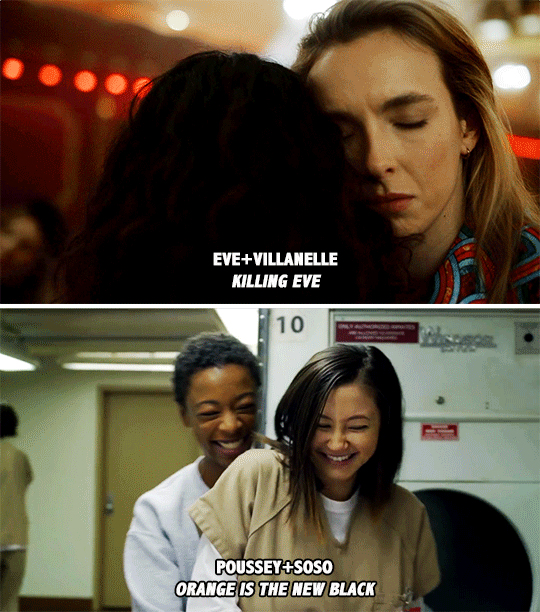

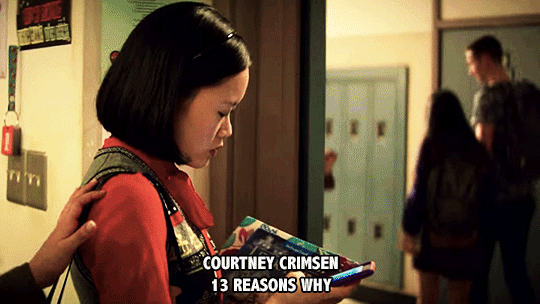
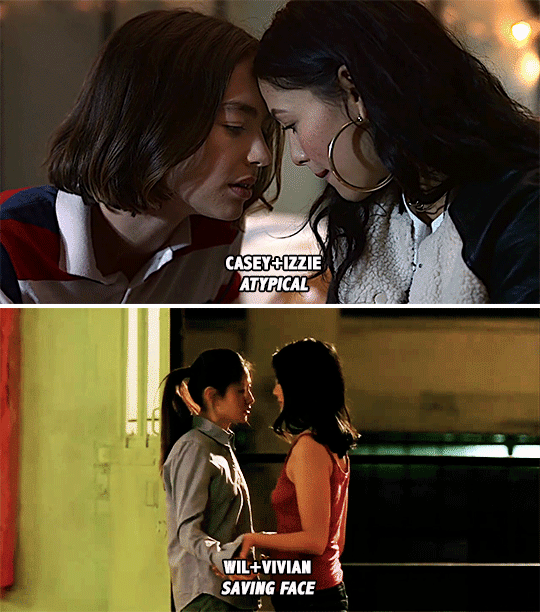
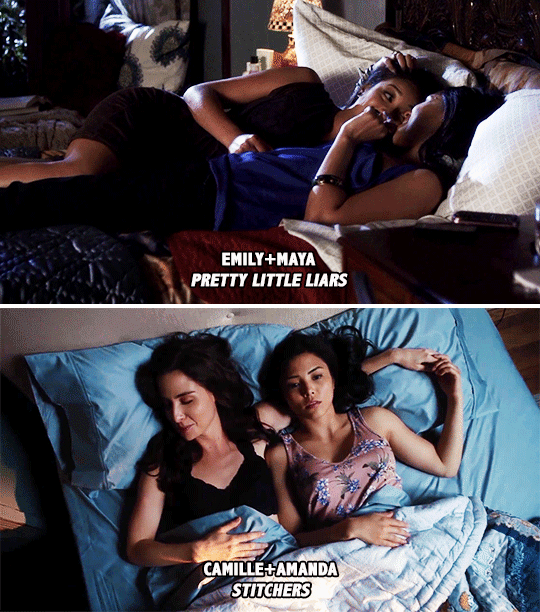
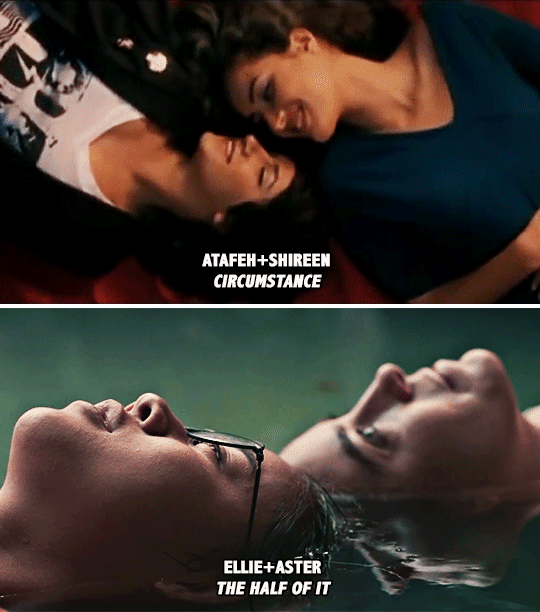


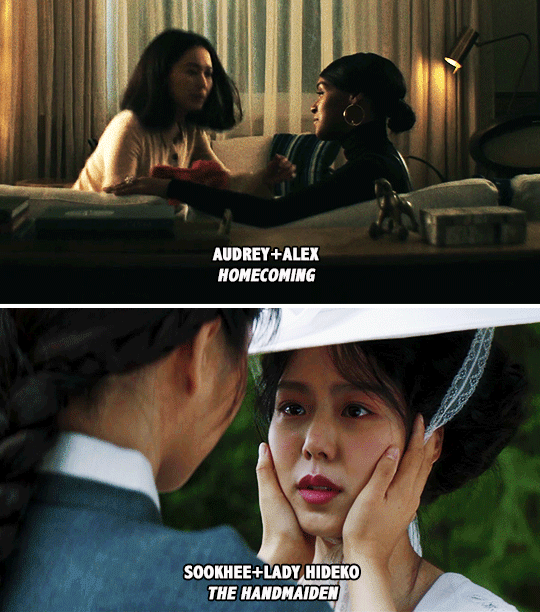
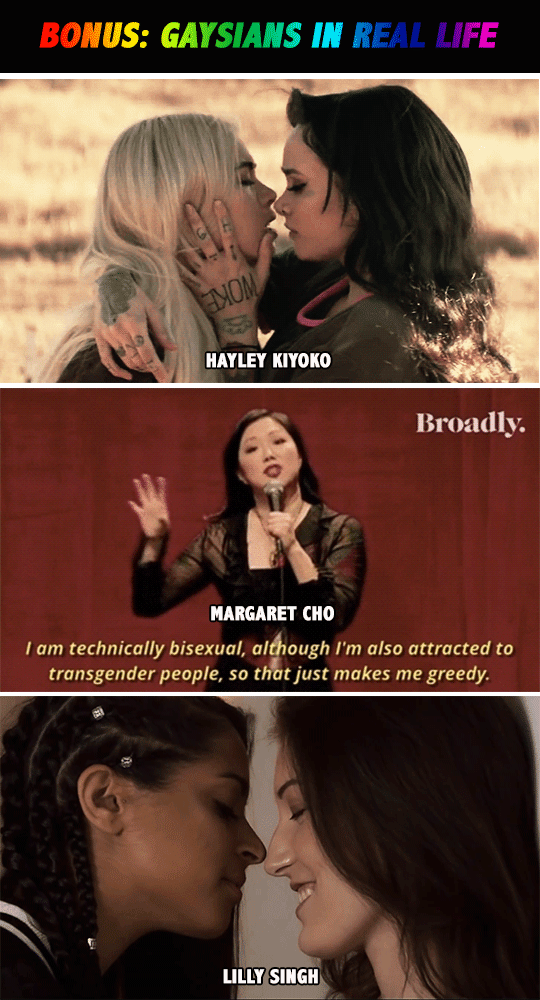
SOFT MOMENTS feat. ASIAN WLW
Happy Pride to all my Asian LGTBQ+ identifying women who love women! We’ve had a good few years in media, but more representation is always needed and welcome, not just for Asians, but all queer women of color, trans women, BLACK WOMEN, BLACK TRANS WOMEN. Shout outs to the HAPAs! Not just the half white HAPAs, but the half-black, half-latinx, half-indigenous HAPAs who often feel erased and not Asian enough on top of being queer. We see you!
Please note, I included all of Asia geographically (not just East Asia) since West Asia and even South Asia are often separated into Indians/Arabs/Middle Eastern people. This was a good excuse for me to sneak in Arthie, Kadena, Circumstance, and I Can’t Think Straight.
I made this specifically because AAPIHM and Pride Month are one after the other, so it felt right to make it and celebrate those identities together!
Because we need a moment to breathe amidst all the chaos and because PRIDE is a celebration as much as it is a fight for our lives, consider playing this drinking game! Cheers!
🍷Drink if the ship has an Asian.
🥃Drink if the ship has two WOC.
🍷Drink if the ship is in bed.
🥃Drink if the ship is touching foreheads.
🍷Drink if the ship is dancing. Drink twice if their eyes are closed.
🥃Drink if they are GAYZING™ into each other’s eyes.
🍷Drink if someone is holding the other’s face.
🥃Drink if there is hand-holding or finger stroking.
🍷Drink if the ship is back-hugging
🥃Drink if they're playing with each other's hair.
🍷Drink if your ship is floating.
🥃Drink if one or both have saved the other’s life.
🍷Drink if the ship is smiling.
🥃Drink if the ship is yearning.
🍷Drink if the ship had a BETRAYAL at some point in the relationship.
🥃Drink if you can feel the sexual tension through the GIF.
🍷Drink if your ship changed your life.❤️
#lesbian#lgbtq#killing eve#the half of it#hayley kiyoko#korrasami#pride month#deanoru#kadena#pretty little liars#the bold type#runaways#janelle monae#black lightning#13 reasons why#thundergrace#the handmaiden#mine
11K notes
·
View notes
Text
Book Review
What’s this book?
Felix Ever After by Kacen Callender
What’s the summer you copy pasted from Goodreads?
Felix Love has never been in love—and, yes, he’s painfully aware of the irony. He desperately wants to know what it’s like and why it seems so easy for everyone but him to find someone. What’s worse is that, even though he is proud of his identity, Felix also secretly fears that he’s one marginalization too many—Black, queer, and transgender—to ever get his own happily-ever-after.
From Stonewall and Lambda Award-winning author Kacen Callender comes a revelatory YA novel about a transgender teen grappling with identity and self-discovery while falling in love for the first time.
What was your experience with this book?
I binge read this book overnight. I haven’t done that in a long, long time. I feel that says why I like this book so much. It grips up and it keeps you up, wanting more and more.
What do you think I should read it?
They really don’t shit like this anymore. It’s rare. It’s good. Give it a shot.
What was your favourite thing about this book?
One of the key themes of this book is identity and self-discovery. I think a lot of queer people grow up thinking that once you figure out who you are (i.e. identity your label) it’s over and your journey of self discovery comes to an end.
But I don’t think it’s ever that simple. One of the hardest, and sometimes the beautiful, thing about about queer is the constant relearning of who you are. I have been recently struggling with my own labels and I think as queer people. we have a tendency to feel guilty when we do that. We feel like we are overthinking or we are being too pernickety or we are putting people around us through unnecessary burden.
The whole point of being queer is not to choose a label and figure out who you are. The point is to remember that you are allowed to be who you are whether you figure it out or not. The point is that you deserve love and respect regardless of the label you choose or don’t choose.
I don’t think I’ve ever read a book in my life that articulates this theme so well and so poignantly. It was much needed. I would definitely recommend this book to queer youth who are thinking over their identity and questioning. But just queer people in general. Tis a good one.
Your favourite character?
Ezra Patel. I love me a boy who pines. Also south asian queer representation? Are you kidding me???
Your favourite quote?
“I see at least one thing a day that makes me wonder if the straight people are all right.”
“Just because you don’t understand my identity, doesn’t mean I’m not real. That I don’t exist.”
“If I fall in love again, it'll be with a woman who loves me also - not someone who I have to convince to love me. It's easier, I think, to love someone you know won't love you - to chase them, knowing they won't feel the same way - than to love someone who might love you back. To risk loving each other and losing it all.”
#annnnnd time to go to work now#felix ever after#book recs#dani reads stuff#book reviews#lgbtq#transgender
35 notes
·
View notes
Text
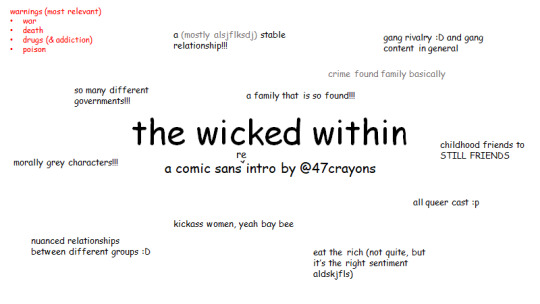
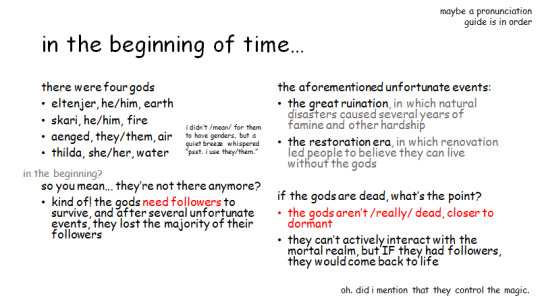
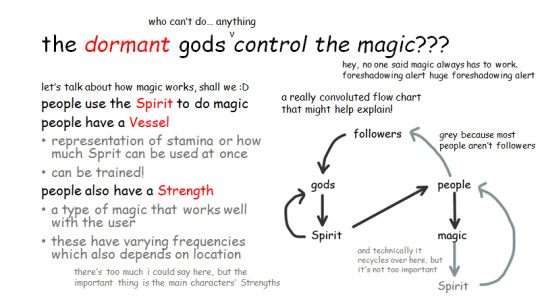
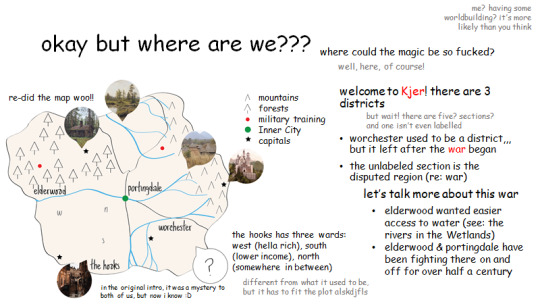
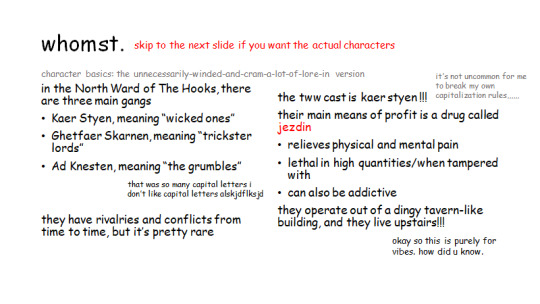
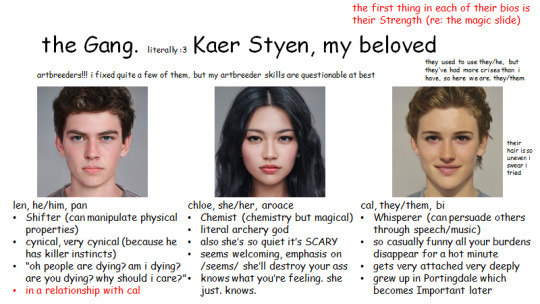
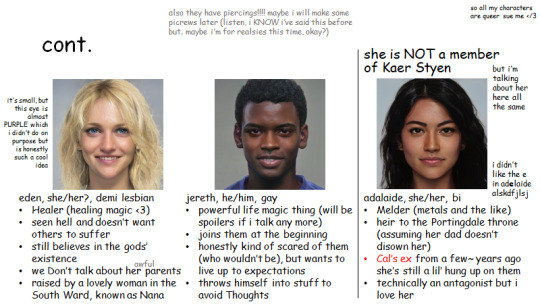
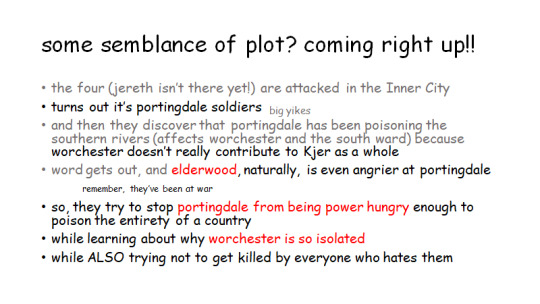
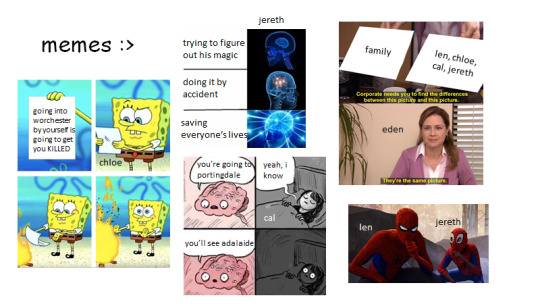
THE WICKED WITHIN—A COMIC SANS WIP REINTRO
!!!!! it's here :D the wip that started to consume me and has been continuing to do so since, now with a much better sense of what exactly is Happening
current tww taglist let me know to be +/- !! @a-completely-normal-writer @writing-is-a-martial-art @wannabeauthorzofija @magic-is-something-we-create @croctears @writeblrfantasy @opes-magnas @author-a-holmes @zoya-writes@fuyugomori @ink-fireplace-coffee
transcript is under the cut!!!
[transcript: a powerpoint presentation of black text on white background, written entirely in comic sans.
start slide one
the top left corner reads in red, "warnings (most relevant) war, death, drugs (& addiction), poison". in the center, "the wicked within", and underneath it in smaller font, "a comic sans reintro by @47crayons". the comments around the entire slide read "a family that is so found!!!", "gang rivalry :D and gang content in general", "crime found family basically", "childhood friends to STILL FRIENDS", "all queer cast :p", "eat the rich (not quite, but it’s the right sentiment aldskjfls)", "kickass women, yeah bay bee", "nuanced relationships between different groups :D", "morally grey characters!!!", "so many different governments!!!", "a (mostly alsjflksdj) stable relationship!!!"
end slide one
start slide two
in the beginning of time… there were four gods: eltenjer, he/him, earth; skari, he/him, fire; aenged, they/them, air; thilda, she/her, water. i didn’t /mean/ for them to have genders, but a quiet breeze whispered “psst. i use they/them.” in the beginning? so you mean… they’re not there anymore? kind of! the gods need followers to survive, and after several unfortunate events, they lost the majority of their followers. the aforementioned unfortunate events: the great ruination, in which natural disasters caused several years of famine and other hardship. the restoration era, in which renovation led people to believe they can live without the gods. if the gods are dead, what’s the point? the gods aren’t /really/ dead, closer to dormant. they can’t actively interact with the mortal realm, but IF they had followers, they would come back to life. oh. did i mention that they control the magic.
end slide two
start slide three
the dormant gods who can't do... anything control the magic??? hey, no one said magic always has to work. foreshadowing alert huge foreshadowing alert. let’s talk about how magic works, shall we :D people use the Spirit to do magic. people have a Vessel (representation of stamina or how much Sprit can be used at once, can be trained!). people also have a Strength (a type of magic that works well with the user, these have varying frequencies which also depends on location). there’s too much i could say here, but the important thing is the main characters’ Strengths. the right depicts an image of a flowchart showing that gods need followers and produce sprit. people need spirit to do magic.
end slide three
start slide four
okay but where are we??? where could the magic be so fucked? well, here, of course! the left side shows a line art map, split into five parts going clockwise: portingdale, worchester, the hooks, elderwood, unlabeled. the legend shows that there are mountains in portingdale, forests in elderwood, and rivers that run from portingdale to everywhere else. the place where the four labeled regions meet is called the Inner City. the text on the right reads. welcome to Kjer! there are 3 districts. but wait! there are five? sections? and one isn’t even labelled. worchester used to be a district,,, but it left after the war began. the unlabeled section is the disputed region (re: war). let’s talk more about this war. elderwood wanted easier access to water (see: the rivers in the Wetlands) elderwood & portingdale have been fighting there on and off for over half a century. the hooks has three wards: west (hella rich), south (lower income), north (somewhere in between).
end slide four
start slide five
whomst. skip to the next slide if you want the actual characters. character basics: the unnecessarily-winded-and-cram-a-lot-of-lore-in version. in the North Ward of The Hooks, there are three main gangs. Kaer Styen, meaning “wicked ones”, Ghetfaer Skarnen, meaning “trickster lords”, Ad Knesten, meaning “the grumbles”. that was so many capital letters i don’t like capital letters alskjdflksjd. they have rivalries and conflicts from time to time, but it’s pretty rare. the tww cast is kaer styen !!! their main means of profit is a drug called jezdin. relieves physical and mental pain. lethal in high. quantities/ when tampered with. can also be addictive. they operate out of a dingy tavern-like building, and they live upstairs!!! okay so this is purely for vibes. how did u know.
end slide five
start slide six
the Gang. literally :3 Kaer Styen, my beloved. the first thing in each of their bios is their Strength (re: the magic slide). artbreeders!!! i fixed quite a few of them, but my artbreeder skills are questionable at best. this slide is split into three columns. the first column shows a white person with short, brown, curly hair and a firm, but not angry, facial expression. len, he/him, pan. Shifter (can manipulate physical properties). cynical, very cynical (because he has killer instincts). “oh people are dying? am i dying? are you dying? why should i care?” in a relationship with cal. the second column shows a person who appears east asian with long, black, wavy hair and fair skin. chloe, she/her, aroace. Chemist (chemistry but magical). literal archery god. also she’s so quiet it’s SCARY. seems welcoming, emphasis on /seems/ she’ll destroy your ass. knows what you’re feeling. she just. knows. the third column shows a white person with dirty blonde hair. they are smiling. cal, they/them, bi. Whisperer (can persuade others through speech/music). so casually funny all your burdens disappear for a hot minute. gets very attached very deeply. grew up in Portingdale which becomes Important later.
end slide six
start slide seven
cont. also they have piercings!!!! maybe i will make some picrews later (listen, i KNOW i’ve said this before but. maybe i’m for realsies this time, okay?) this slide is also split into three columns. the first a smiling white female with light blonde hair. eden, she/her?, demi lesbian. Healer (healing magic <3). seen hell and doesn’t want others to suffer. still believes in the gods’ existence. we Don’t talk about her awful parents. raised by a lovely woman in the South Ward, known as Nana. this eye (left) is almost PURPLE which i didn’t do on purpose but is honestly such a cool idea. the second column shows a partially smiling black man with short curly hair. jereth, he/him, gay. powerful life magic thing (will be spoilers if i talk any more). joins them at the beginning. honestly kind of scared of them (who wouldn’t be), but wants to live up to expectations. throws himself into stuff to avoid Thoughts. the third column shows a woman with brown skin, black wavy hair, and a small smile. she is NOT a member of Kaer Styen, but i’m talking about her here all the same. adalaide, she/her, bi (i didn’t like the e in adelaide alskdfjlsj). Melder (metals and the like). heir to the Portingdale throne (assuming her dad doesn’t disown her). Cal’s ex from a few~ years ago she’s still a lil’ hung up on them. technically an antagonist but i love her. so all my characters are queer sue me </3
end slide seven
start slide eight
some semblance of plot? coming right up!! the four (jereth isn’t there yet!) are attacked in the Inner City. turns out it’s portingdale soldiers. and then they discover that portingdale has been poisoning the southern rivers (affects worchester and the south ward) because worchester doesn’t really contribute to Kjer as a whole. word gets out, and elderwood, naturally, is even angrier at portingdale (remember, they've been at war). so, they try to stop portingdale from being power hungry enough to poison the entirety of a country while learning about why worchester is so isolated while ALSO trying not to get killed by everyone who hates them.
end slide eight
start slide nine
memes :> the first is the meme of spongebob reading a sheet of paper and burning it. the paper reads, "going into worchester by yourself is going to get you KILLED", and spongebob is labelled "chloe". the second is the levels of brain template labelled "jereth". from the weakest to most powerful: "trying to figure out his magic", "doing it by accident", "saving everyone's lives". the third is the sleeping person and brain meme. brain: "you're going to portingdale". cal: yeah, i know. brain: you'll see adalaide. cal's eyes are wide open in fear. the fourth says "corporate needs you to find the difference between this image and this image". the first image says, "family", and the second one says, "len, chloe, cal, jereth." eden says, "they're the same picture". the fifth is the spiderman copycat meme where jereth is copying len.
end slide nine
/end transcript]
80 notes
·
View notes
Note
Thanks for your tags on the heartstopper tropes post. As always, it's really about having a bit (or a lot!) of everything, at least in different medias, sometimes in the same. It's bad if it's the only thing we have, but the tropes aren't bad per se (and sometimes it will be the kind of stories I need, for plenty of reasons). I'm very happy that we have a wholesome queer story like heartstopper. Basically I'm always happy to have more queer stories, which means quantity but also variety.
Yes yes yes. Ig the post is good but putting the word "bad" was just... Just off putting. I've said this and I always say it, diversed and nuanced queer representation can coexist. Wether its queer joy or just what others put it in a fatalistic and miserablistic category. and both are as necessary and important to have. Bc representation on screen should most importantly concern the people that are represented and not all queer people can have those specific realities that the post cited. Also you're not tired of seeing the same "stereotypical queer tropes" you're just consuming the same product of the same industry, if you want to see these tropes well represented, just try to expand, watch Asian, MINA region, African and European (specially east europe), south American LGBTQ+ cinema.
5 notes
·
View notes
Link
In a candid conversation with the Star, Manji said “Schitt’s Creek” producers did not instruct him as to how Ray should sound.
“It is a very slight Indian accent — somebody who was probably raised in Canada, but probably was born in India or Pakistan,” he said from his home in Los Angeles.
“I don’t regret that because I think it actually works for Ray. He wasn’t like everybody else in that town. He was from somewhere else.”
Manji said he’s OK with viewers questioning his choices, but rather than focus on accents, he said, critics could ask why his character didn’t have a more fully developed story, like a relationship or a family.
“If you want to criticize something, do that,” he said. “We need to have three-dimensional characters.”
[full article text below the cut]
At the start of Rizwan Manji’s acting career in the 1990s, the only roles available to him were those playing convenience store clerks and cab drivers. The parts usually required him to fake an Indian accent — just for laughs.
“We would joke about it. ‘This is so offensive, this is so offensive,’” recalls the Toronto native. “It’s not like we didn’t know.”
More than two decades later, Manji’s grin-and-bear-it perseverance has paid off. At 46, Manji now boasts a long — and diverse — list of TV and film credits. In September, he joined castmates from the hit CBC comedy series “Schitt’s Creek” in celebration as the show nabbed a record-breaking nine Emmy Awards.
That doesn’t mean, however, he still doesn’t grapple with questions about his acting choices.
While “Schitt’s Creek,” about a wealthy family that loses its fortune and is forced to move to a backwater town, won raves for its messages of inclusivity and positive queer representation, a segment of viewers took to social media to criticize Manji’s character, Ray Butani, the town’s bumbling jack of all trades — who speaks with an accent.
What irked them was that Ray, one of the few recurring people of colour on the show, seemed like a caricature — a rehash of the stereotypical, emasculated South Asian male. They also complained that Manji’s accent came across as “cringey.”
“Why go to the effort of writing in a character with an Indian name, played by an Indian actor, whose main personality trait is that he is stupid and has an accent?” Rishi Maharaj, a Port Hardy, B.C., engineer and avid TV viewer, wrote on Twitter days after the show’s Emmy sweep.
Across North America’s TV and film industry, there is broad consensus about the need to fight stereotypes and offensive tropes in casting. But the debate among actors of colour over whether they should fake accents remains fraught.
Some Hollywood actors, such as Aziz Ansari and John Cho, have reportedly turned down roles, citing the history of Hollywood playing up accents for laughs. (Think Mickey Rooney’s portrayal of Mr. Yunioshi in the 1961 romantic comedy “Breakfast at Tiffany’s,” complete with taped eyelids, buck teeth and cartoonish accent).
They worry that parts requiring them to speak with accents do nothing to help the cause of minority actors who are often typecast in secondary roles or as sidekicks, and who continue to be under-represented on TV and film.
Others say it’s important to represent linguistic diversity and see no harm portraying characters who speak in broken English, as long as their accent is not the butt of a joke and in keeping with a character’s backstory.
In a candid conversation with the Star, Manji said “Schitt’s Creek” producers did not instruct him as to how Ray should sound.
“It is a very slight Indian accent — somebody who was probably raised in Canada, but probably was born in India or Pakistan,” he said from his home in Los Angeles.
“I don’t regret that because I think it actually works for Ray. He wasn’t like everybody else in that town. He was from somewhere else.”
Manji said he’s OK with viewers questioning his choices, but rather than focus on accents, he said, critics could ask why his character didn’t have a more fully developed story, like a relationship or a family.
“If you want to criticize something, do that,” he said. “We need to have three-dimensional characters.”
The character that has generated one of the most heated debates in recent years when it comes to accents is Apu, the Indian-American shopkeeper on the long-running animated series “The Simpsons.” Until recently, the thick-accented character was voiced by actor Hank Azaria, who is white.
In 2017, American comedian Hari Kondabolu came out with a documentary, “The Problem With Apu,” in which he pressed the case that the show fomented racial stereotypes about Indian people.
In interviews at the time, Kondabolu shared that, as a kid, Apu was “the only Indian we had on TV” and that he was happy for “any representation.” But then on the playground, he had to deal with kids mimicking Apu’s accent.
In the documentary, he gets Dana Gould, a former writer on the show, to admit, “There are accents, that by their nature, to white Americans, sound funny. Period.”
With criticism mounting, Azaria, who had voiced Apu for three decades, announced he was stepping away from the role, telling the New York Times earlier this year: “Once I realized that that was the way this character was thought of, I just didn’t want to participate in it anymore.”
There is growing sensitivity among artists, writers, directors and producers to avoid stereotypes and invest in “fully humanized, realized characters,” Steven Eng, an actor and voice and speech instructor at New York University, told the Star.
“There’s certainly been a whole history — that I don’t think any of us can deny — in film and television and the theatre where characters were stereotyped,” he said. “I think there’s so much more awareness, so much more determination to not go that route.”
But even “groundbreaking” shows, such as “Kim’s Convenience” and the recently cancelled “Fresh Off the Boat,” which were heralded for elevating Asian-Canadian and Asian-American visibility and immigrant experiences, have not escaped criticism, accused by some viewers of employing storylines and accents that do not ring true.
Cast members, in turn, leapt to the defence of their shows — and their accents.
“Some people are like, ‘Oh, stereotypical accent!’” Constance Wu, lead actress on “Fresh Off the Boat,” told Time magazine regarding her character’s Taiwanese accent. “An accent is an accent. If there were jokes written about the accent, then that would certainly be harmful. But there aren’t jokes written about it. It’s not even talked about. It’s just a fact of life: immigrants have accents.”
Paul Sun-Hyung Lee, the lead actor in “Kim’s Convenience” told Maclean’s his character’s Korean accent is “part of who he is, but it isn’t the joke.”
“Yes, we’re in the entertainment field, and we will mine some of that because it is situational humour. You will get a point where we’ll say, ‘Here’s where some fun can be made, playing with the accent, and his inability and people mishearing what he says.’ But at the same time, that’s not all it is,” he said.
Jimmy O. Yang, who starred in the HBO series “Silicon Valley” and whose character spoke with a heavy Chinese accent, told Huffington Post the key is to portray immigrants with humanity.
“It’s maybe a better thought to change the perception of an accent than to avoid it all together,” he said. “I take offence (when people don’t go for parts with accents) ― it’s like saying, ‘I’m better than my immigrant brother with an accent.’”
Yang added he drew inspiration from his mom and relatives in Shanghai to develop his accent for the show. “It’s not just a (lousy) impression of a Cantonese Bruce Lee accent.”
Still, some actors have declared outright they will not do it.
“For me, personally, any time I’ve been asked to do that, I feel like — it feels like it’s making fun of people that have that accent if I do it and don’t have that voice,” comedian Aziz Ansari told NPR in 2015, years before he faced a public allegation of sexual misconduct.
“It feels like you’re doing it so white people can laugh at Indian people,” he said at the time.
That’s kind of how Maharaj felt watching Ray on “Schitt’s Creek.”
“I did find it cringey. The first thought that came to mind was it reminded me of Apu in ‘The Simpsons,’” he told the Star.
In The Problem With Apu, South Asian-American comedian Hari Kondabolu confronts his long-standing “nemesis” Apu Nahasapeemapetilon – better known as the Indian convenience store owner on The Simpsons. Creator and star Kondabolu discusses how this controversial caricature was created, burrowed its way into the hearts and minds of Americans, and continues to exist – intact – nearly three decades later. Featuring interviews with Aziz Ansari, Kal Penn, Whoopi Goldberg, W. Kamau Bell, Aasif Mandvi, Hasan Minhaj, Utkarsh Ambudkar, Aparna Nancherla
“To me what it sounds like is what a person from Saskatoon thinks a person from India sounds like. ... I’m sure he could’ve been a funny part of that show without an accent.”
Maharaj wasn’t alone. Arif Silverman, an actor and playwright in New York, posted a lengthy Facebook post in October sharing his conflicted feelings about the show.
“Schitt’s Creek has become one of my all-time favourite shows. But they did their South Asian characters dirty,” he wrote.
“Especially Ray, who plays directly into the racist South Asian trope of being an emasculated, goofy buffoon who no one takes seriously, not least in part because of his accent.”
Silverman told the Star Ray’s accent seemed “part of the joke” and struck him as a “betrayal” from a show that preached inclusivity and whose main romance was a gay love story.
“I’m half South Asian — my mother is from Bangladesh. … And so I think a lot about representation of South Asians in the media,” he said. “If you’re really going to talk about inclusivity it can’t be at anyone’s expense.”
Manji says he faced a lot of struggles as a brown actor at the start of his career.
Back then, he was often pigeonholed into narrow roles, such as the cabbie or 7-Eleven store clerk. One hundred per cent of his roles required him to fake a South Asian accent.
“It was very strictly, like, the joke was on the accent,” he said.
But he accepted the parts because he needed the work.
He did draw a line with one type of role.
“I’m Muslim, so I was more the guy who was like, ‘I’m not being the terrorist.’”
There was one time, however, when he auditioned to play an Islamic Studies professor on the show “24.” He was given limited information about the character. It turned out he was a bomb maker.
But the money was too good to pass up. He took the part.
“I rationalized it in my head, ‘Oh, it’s season 8, and they have good Muslim characters. … I don’t know if I made the right decision,” he said.
“To be clear, I’m OK with being the bad guy. I’d love to play the bad guy. It’s just when it’s this kind of thing where you’re screaming ‘Allahu akbar’ and bombing people.”
In 2010, Manji was cast in the short-lived NBC sitcom “Outsourced” set in an Indian call centre. He and his castmates employed accents, which some critics derided for lack of authenticity.
It’s fine if people want to criticize the quality of the accents, he said, but it wouldn’t have made sense for these characters not to have accents.
“The show was shooting in America about living in India. I don’t know what the other option was,” he said, adding that he channelled his father in developing the accent for that show.
Another thing to keep in mind is that accents have to be understandable to North American audiences, Manji said. For instance, during the filming of the movie “Charlie Wilson’s War,” Manji, who played a Pakistani colonel, said he settled on a “sweet spot” where his accent “sounds foreign” but is “not so thick that it becomes comedic or unintelligible.”
Manji said he did not have to audition for “Schitt’s Creek” but was offered the role of Ray, the town’s real estate agent, travel agent, photographer and Christmas tree salesman.
When he went for his first table read in Toronto, he’d had no prior discussion with the show’s writers or producers about what Ray would sound like.
Because most of his demo tape consisted of his work on “Outsourced,” Manji assumed that was the kind of voice producers were looking for. He went with a slightly toned-down version.
“Afterwards, I went up to Dan (Levy, the show’s co-creator) and said, ‘Hey just want to check in.’ He said, ‘I love what you did. It was funny.’ That ended up being the character for six years.”
Maharaj says he can’t help but feel Manji was selling himself short — playing to what he thought “a white audience might expect or respond more favourably to” to get the job. He likens it to job applicants of Asian descent who anglicize their names on resumes.
“I’m encouraged to hear he had agency, that they weren’t like, ‘We need you to do the accent,’” he said.
“I’d feel better if they were asking him to do a British accent or Brooklyn accent because if you’re doing this Indian accent and the character is comedic, it is nonetheless playing into that trope.”
Levy, who is also from Toronto, declined an interview request. Instead, he released a statement through his publicist.
“Ray was conceived as a character of Indian decent which we cast with Canadian-born actor Rizwan Manji, who is of Indian decent. No accent was called for in the casting or specified in the scripts,” it said.
“The thoughtful choices that Rizwan made in his portrayal in the audition room perfectly encapsulated the warmth and the energy of Ray. All characters on our show were created with love, respect and humanity. It has been gratifying to have these intentions reflected through the overwhelming audience support for these characters. That said, I welcome any perspectives that encourage conversations about diversity, especially in entertainment.”
Despite what critics might think, Manji said he has felt more empowered in recent years to make creative decisions about his characters.
Manji, who had a role in NBC’s musical comedy “Perfect Harmony,” which was cancelled this year, said when he was approached about playing the part of a pastor, he was the one who initiated the idea of giving the character a foreign accent.
Because the character was raised by missionaries, it wouldn’t have made sense for him to not have one.
Conversely, when he was asked a couple years ago to read for a pilot for a dramatic series in which his character was a Muslim father he told the casting director he didn’t want to do an accent.
“I said, ‘You know what? I’d rather not. That’s not going to excite me about this part,’” he said.
“I ended up getting the job. I found my voice.” (The pilot never made it to series).
Manji, who guesses about 60 per cent of his roles in more recent years have involved accent work, says remarks by actors who refuse to do accents are “dangerous” because they could end up limiting the types of roles available to minority actors.
His worry is casting directors will go to India in search of authentic accents, overlooking North American-born actors, like him.
“I’m already marginalized.”
Nobody fusses when Meryl Streep performs with an accent, he adds.
Ishani Nath, a freelance entertainment and lifestyle journalist in Toronto, says anytime she sees an accented character who also provides comedic relief, it raises a bit of a red flag.
But she’s hesitant to criticize actors for taking those roles, knowing that opportunities are not easy to come by.
“I’m way more interested in criticizing writers, producers, (and asking): Why are you asking for these roles to be accented? … Is there an actual reason and backstory?”
Nath says she is starting to notice deeper conversations about how different cultures are represented on screen and what nuances can be added to make characters more complex.
She says a good example of this is the hit movie “Crazy Rich Asians,” whose actors exhibited a range of regional Asian accents.
“It’s important to note that the problem with accent roles isn’t the accents themselves — plenty of characters in ‘Crazy Rich Asians’ have accents, but no one has the exaggerated or generic ‘Asian’ accent that has historically been played for laughs in Hollywood,” she wrote in a 2018 article in Flare.
Jhanik Bullard, a writer and member of BIPOC TV & Film, a collective of Black, Indigenous and people of colour working in Canada’s entertainment industry, says it is no longer acceptable for characters to have accents “just because.”
“It should actually have an authentic origin as to why this character sounds the way they sound,” he said.
Audiences are also not as forgiving as they may have been in the 1990s if the accent sounds botched or inauthentic.
What is encouraging, he says, is that more doors are being opened for people of colour to tell their stories and there are more platforms for those stories to be to told.
To that end, Manji says he and his partners have initiated a handful of projects that are in various stages of development. One is a show about a Muslim guy who becomes mayor of a major city. Another is a sitcom about a “normal Muslim family” — something that “resembles me more.”
Does the character he envision for himself speak with an accent?
“Since I want it to be closer to me, then I would say not.”
#definitely a good discussion about ray and about riz's other roles and about south asian rep in general#schitt's creek#schitts creek#rizwan manji#ray butani#press#toronto star#long post
86 notes
·
View notes
Text
Plan B offers a refreshing alternative to typical teen comedies
I’ve never watched a teen comedy on a streaming service without seeing a trailer first, being messaged a recommendation, or seeing mixed reviews on Twitter. This is especially true in the few cases with South Asian female leads, and after a handful of disappointing casting choices and plot points, I don’t usually have high hopes in the instances I do see someone who looks like me playing the main character.
The Indian Girl is usually highly academically driven, makes self-deprecating jokes about her body hair, and a socially awkward virgin with her eyes set on the (nearly) unattainable athletic, popular white boy. Whether it’s been the writing of Mindy Kaling with The Mindy Project (2012-2015) or Never Have I Ever (2020 - present), Natalie Krinsky’s The Broken Hearts Gallery (2020), you can never have all three:
- a central romance between two South Asian characters
- a South Asian female lead
- the brown woman not being her own constant punchline
I stumbled across Plan B (2021), which is directed by Natalie Morales from a screenplay written by Parthian Srinivasan and Joshua Levy, while mindlessly scrolling Hulu with my partner at the time, who — and I am aware of the hypocrisy — is a white man. Social distancing mandates had caused me to stay home more than ever and entertain shows and movies I hadn’t never caught onto or heard of. I no longer had the excuse of work/grad school because we were off for the summer or other plans to keep me away from what I presumed I would not enjoy. I’m definitely known in my social and even academic/professional circles as a vocational, outspoken media critic (film degree needed to go somewhere), particularly in regards to anything that attempts to champion representation for Indian women and/or queer folks.
“Ugh, this is probably going to be about a nerdy Indian girl who wants to ‘lose her virginity’ to a generic white boy,” I remember muttering, not even clicking to see the trailer or Wikipedia’ing the entire cast as I often do when I think I recognize someone from somewhere. (Hunter was the only vaguely familiar face; he is played by Michael Provost, who is known for playing Brick Armstrong in Netflix’s 2018-2019 series Insatiable, another show I decided to delve into during the pandemic.)
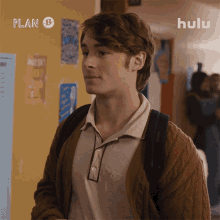
Again, I am aware that I myself carry biases and am constantly working through my own self-criticism as the highly academically driven Indian girl who “lost her virginity” to a white boy, too. I think that is part of my frustration with media that reinforces my own unoriginality and susceptibility to the most common narrative about people like me that could ever be made available to the masses.
My partner headed home for the night, and I ended up watching Plan B anyways while waiting for the text that he had arrived back at his place. This got me through more than half the film in the meantime. Call it a desire to chase my confirmation bias, cure my boredom, or maybe even indulge in a brief moment of open-mindedness and giving the movie a chance. Sometimes, we just click on something to help us pass the time, don’t we?
The movie starts as many teen flicks do, with an alternating montage sequence of our main character, Sunny (played by Kuhoo Verma) getting ready for the school day, contrasted by the routine of her best friend, Lupe (played by Victoria Moroles), the rebellious stoner type who begins vaping upon waking up. The dollhouse-like interior of Sunny’s bedroom is where she turns her stuffed elephant’s eyes away as she starts masturbating to an image of a naked person in her biology textbook, the closest she gets to a penis (until later that night). This scene alone probably should’ve been a sign that the nerdy virgin trope is being exaggerated, and this film is being ironic, but my past viewership of such narratives and depictions made it take me a bit longer to realize Plan B is actually a parody of everything I love to hate about these kinds of movies. And it did it so well, it seemed sincere. Which makes everything even funnier.

Religious, conservative parents who leave little room for independence, mistakes, or creative expression. Check. This will fuel the fire, the secrecy, the mayhem that is going to ensue to keep whatever the secret is.
Establishing shots of a small, boring town that cannot contain their personalities or desires. Check. check.
Solo slumber parties with the only other friend you have who also indulges your nerdy hobbies, like anime and thousand-piece puzzles. Okay. Slumber party becomes a “rager” to capture the attention of the love interest while Sunny’s mom is conveniently out of town. Nothing new here.
But I was ignoring, in my own hunt for righteousness, that Sunny and Lupe are witty, unconcerned with popularity, and content in each other’s company. There are love interests, sure, but these girls aren’t pining for school wide validation, trying to win prom queen, or victims of a cruel bet. Megan and Emma are the popular girls (thin, white blondes who display their sexuality more explicitly to contrast the inexperienced Sunny) who get barely any screen time, with very little dialogue. Looking back, that might be one of the top three things I appreciate about Plan B. It didn’t entertain the idea that Sunny or Lupe wanted to be Megan or Emma, or that the other girls were necessarily the enemy.
Our dynamic duo is just angsty and horny, in a way that is honest and humorous without being crass or a regurgitation of every other portrayal of a sexually frustrated main character who will do whatever it takes to get the guy. In this story, the main character is driven by the will to do whatever it takes to not be pregnant, which will be more devastating for her than graduating as a virgin.
Lupe’s astute observations, snappy comebacks, and apathy for the opinions or well-being of anyone but her best friend complements Sunny’s anxious demeanor well. At one point, she counters Sunny’s description of her crush Hunter as “an athletic librarian” with the remark that wearing a cardigan while playing hockey actually just gives off “major guidance counselor vibes”. Lupe’s presence and commentary is not only a comedic foil to Sunny, but throughout the film, we see how she does not sacrifice her independent thoughts and desires to serve Sunny’s story, and Lupe herself gets a proper plot line that is explored meaningfully while the night goes on.
Like I said, it’s nice to not see screen time dominated by the forgettable popular girls (I had to Google the character list, that’s how little they are mentioned). I think the most memorable interaction was when one of the girls, Megan, grabs Hunter’s hockey stick euphemistically and comments how it’s dry(?) and proceeds to run her tongue upside it, as Hunter advises, “I definitely wouldn’t lick it.”
Some other classic traits of the teen comedy you may be able to spot are well distributed throughout the scenes in the high school and podunk small town places Sunny and Lupe that head to in their wild goose chase for a Plan B pill or the generous doors of Planned Parenthood.
The characters themselves often make jabs at many of the tropes that they represent themselves, reminiscent of the meta-comedic and punchy writing of Mean Girls (2004). There’s even a random line reminiscent of the tampon/pad joke about heavy flows, but I don’t know if that parallel was intentional. I also never expected to talk about that movie like it’s historical cinema. Oof.
Even socially uncoordinated and easily flustered Sunny provides a lot of snappy one-liners that land as criticisms of how teenage/Indian girls are perceived and not as conformity. And Kuhoo’s comedic timing and facial expressions — notably the entire time her character is accidentally high — are some definite highlights. Sunny is an underdog I was actually rooting for, and not because you’re supposed to even when the character is unlikeable. Sunny is likeable, and when we really only have the messy Mindy Lahiri or Devi Vishwakumar as examples, it was nice to want things to work out for her for reasons other than “Oh, finally an Indian girl as the lead! I have to like her no matter what!” Sometimes, I feel hesitant to be as critical of the few media representations I have because I don’t want to come across like I haven’t worked on my internalized racism or misogyny; I have and of course I still am. At the same time, there are productions in which the few South Asian characters I get to see are very difficult to defend, even if they are written as quirky, understandably flawed, or a “hot mess”.
Plan B makes room, without negotiating, for other important parts of teenagehood. At the root of the story is the bond between two best friends who treat each other’s company as what will make high school, heartache, an unexpected pregnancy, angry parents all survivable. Sunny and Lupe’s friendship is a love story in itself, as they show audience members all you really need is that one best friend at a party, on a road trip, through all the chaos of your life, as the trusted keeper of your secrets.

Similar to Never Have I Ever’s Devi and other teen movies, Sunny also participates in the omission of truth about who, if anyone, she loses her virginity to. Hunter isn’t concerned with public image or aligns with the dumb jock stereotype, instead offering a more surprising charm that even Sunny isn’t aware of at first. It is worth noting how much focus is placed on giving dimension to side characters in this movie, even if how they act doesn’t change the course of the plot overall.
I also appreciate the mention of the Indian Mafia, which, if you don’t already know what it is, you will find out after watching. And despite Lupe’s reassurance and this movie being fiction, it is very much real.
And so is the problematic “conscience clause”, mentioned early on as an obstacle to Sunny’s body autonomy. Important reminders of the additional barriers that young women of colour face in seeking reproductive healthcare in this country can be found throughout the mayhem that the two friends have to endure. At the same time, the movie also makes space for a low brow line in which Sunny complains that it will take 69 hours to get to the nearest Planned Parenthood.
Without denying or pigeon-holing the experiences of closeted queer teens, Plan B also reminds viewers that there are places throughout the country where kids do not feel safe to be themselves and do find solace, support, and love in online communities.
I found both Kuhoo Verma’s and Victoria Moroles’ individual portrayals of 17-year-olds juggling various aspects of their identities and their dynamic together as breakout performances, and I look forward to seeing what else they star in.
The pacing of the film is naturally aided by the race against the clock when it comes to the efficacy of retrieving and taking the morning after pill, but there is a fun rhythm that balances coincidence, pleasant surprises, and complete shock that challenged everything I thought I was going to see by the time I got to the middle of the movie. Often, there is a lazy montage to indicate the passage of time and the viewer has the responsibility of filling in the plot with an understanding that relationships have developed, changed, or fizzled out. But Plan B keeps you comfortably engaged, and by the time my partner texted me that he was home, I happily accepted that I actually had no idea what was going to happen in this movie and that it had grown on me. I was enjoying the ride that Sunny and Lupe’s overnight misadventures were taking me on as an amused bystander, and that wasn’t a feeling I had gotten from anything aimed at a young adult audience in awhile.
It even captures nuanced parts of being a teenager of color in a small, predominantly white town, like the gentle, fluttery feeling of finally getting to spend time with someone who helps you peel back so many layers, the unexpected blending of friend groups, innocent misinterpretations, and the underestimation of the love of parents who do try to sustain tradition but still know how to unconditionally love and support their children. This is especially important to see in 2021.
I appreciate the soft, mundane but vulnerable moments where the characters grow closer. There doesn’t need to be a massive blow out or tear that needs mending - though those moments do occur - for relationships to progress, and it takes good writing to not have to rely on “this only happens in movies” moments. People become friends and sometimes more in the regular, everyday moments during conversations, meals, or in chilly parking lots in South Dakota of all places.
In hindsight, I am glad I didn’t watch the trailer for Plan B, even if it likely would have meant I would have picked up on what was ironically or unironically included in the story. Because it meant that I got to enjoy the movie as a chaotic buddy comedy (Verma and Moroles are seriously hilarious together) and remove the lens of criticizing just how Indian and queer and feminist based on previous disappointments it could be. I wasn’t even watching it with the intention to write a review after, which would otherwise automatically apply the critical lens and often ruins my own viewing experience because I’m mentally picking the movie or show apart.
I’m writing this review mostly to say I liked having my skepticism put in check. Scattered across various stereotypical plot points were instances that made me appreciate that people are still making these types of movies, a genre I was hoping would die out if it was going to keep giving us the same formula.
Because that means there are going to be movies like Plan B, which take a different route.
#plan b#hulu#kuhoo verma#victoria moroles#film review#pastelpressmachine#sincerelybillie#desi#desi representation#south asian
13 notes
·
View notes
Note
At this point I think we can pretty much expect a woc Sophie. If Netflix is this panicky about a gay man playing their male lead in a hetero love story I don't see them doing a queer love story with a bi Benedict and genderbended Sophie. As racist as the fandom can be they've much more homophobic. Also a white Sophie would be a bad look for them, so they've pretty much put themselves in this situation where they have to get poc as love interests for their white leads. Except for season 4 of course because we already have 2 white leads for that...
I mean I don’t think they care about what’s a bad look regarding race, tbh. They handled it horribly in s1, they had a white woman rape a black man and never even apologize, they’re putting Simone in the corner in favor of their white fave….
And I think my whole point is that there’s no solution that we can trust them to handle well. Casting a woc does not equal good rep. They cast a black man in s1 and had him and a black woman discuss one of THEM loving one of US. They cast a south Asian lead and thought it would be a good idea to have her come from India where it’s much freer~. Representation is not inherently GOOD rep and I think the writers and many viewers need to reckon w that. I agree that a woc as Sophie is the most likely option, but I’m not going to be throwing a party about it when I know that the most likely avenue this show is going to take is making her a virtual slave for her white stepfamily. Even if Benedict is less of a harasser than he was in the book, which I do think he will be (show!Benedict is a much better guy) the issue of her family will remain.
And the alternative is making her family NOT the Cowpers, in which case we have a family of poc who are just abusing Sophie until she gets saved by the white Bridgertons? Idk, from a writing perspective there are very few good options out of this unless they tear the entire thing apart and make Sophie and her family unrecognizable from their book counterparts. Which, honestly? Fair. AOFAG is a pretty weak entry in the series—it’s straight up Cinderella with a heroine who is probably the flattest of all of the Bridgerton heroines. Daphne was flawed (too flawed), Kate was insecure, Penelope is WHISTLEDOWN LMAO, Eloise was aimless and needed direction so she made a crazy decision, Francesca was wallowing in grief and carnal, Hyacinth was a perky adventuress, and Lucy…. Was also there, but she at least was jealous of her best friend versus just…. Cinderella. And I love Cinderella! But Sophie is just soooooooooo. I don’t know. Waiting for life to happen? Sure, she has principles (she won’t be a mistress) but even those fall apart fairly easily. I don’t dislike her, I just don’t feel anything for her, and they will have to make her more active on the show to make people care more. This is why Kate is out here riding horses and shooting guns and shit—her internal dialogue is inaccessible to a tv audience. Sophie has to have her game upped.
4 notes
·
View notes
Text
Torchwood and the (Mis)treatment of its Characters of Color
Let’s be honest; despite its decent track record with queer characters, Torchwood has a problem with how it treats its characters of colors, and I say this as a South Asian, bisexual fan of the show.
For the purposes of this post, I will only be looking at the Torchwood television series (so spoilers for Seasons 1 and 2, Children of Earth, and Miracle Day), and not as Big Finish Torchwood releases since I do not believe myself to be well-versed enough in them to be able to make an accurate post. And also, as much as I love Big Finish for eveything they’re doing, on-screen POC representation is very different from audio POC representation. (And for the purposes of this post, I will not be addressing the mistreatment of Martha Jones, which really, if you think about it, stems from Doctor Who and not Torchwood.)
TLDR; Torchwood has neglected or mistreated its characters of color, given them little or no background, and brutally killed them off, often for shock value.
Let’s start with Suzie Costello.
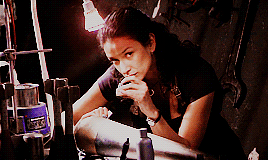
Suzie Costello, played by Indira Varma who is a British actress of Indian descent, was promoted alongside the regular cast members in publicity material before “Everything Changes” aired, giving the impression that she would be sticking around for a while or would be a main character. Instead, she was unceremoniously killed off at the end of the first episode and only pops up once more in “They Keep Killing Suzie.” At no point was Suzie acknowledged as a woman of color or given much more background beyond her tumultuous, most likely abusive, relationship with her father.
Next, we get to Toshiko Sato, left as the only person of color on the team after Suzie’s death.
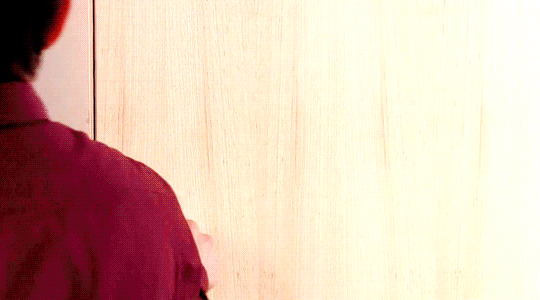
Wonderful, gorgeous, caring Tosh who, for all intents and purposes, is essentially a walking stereotype. She’s an Asian (Japanese specifically) technology genius who is unlucky at love. Need I say more? (Check out this Teen Vogue article if you’re wondering why that’s a bad thing, or, honestly, just quickly search Google.) And all three of the Tosh-heavy episodes (”Greeks Bearing Gifts,” “To the Last Man,” and “Adam”) feature her being unlucky in love (Mary betraying her, Tommy dying, and Adam manipulating her). Plus, there’s everything with Owen where she pines after him for years only for him to finally recognize that before he dies, and then he, well, dies; that plot arc only ends in death and sadness.
Additionally, we only have limited background for Tosh in comparison to Jack and Gwen (who I guess you could kind of say are the main characters) but even in comparison to Ianto (for whom more background was revealed only because he became a more prominent character in COE.) We know she was born in London, moved to Japan as a child, and at some point moved back before growing up in the United Kingdom. She had a younger brother (mentioned in a deleted scene in “Captain Jack Harkness”) and a grandfather who worked at Bletchley Park (mentioned in “Greeks Bearing Gifts” and “Captain Jack Harkness.”) She also very much loved her family, or at least her mother, enough to commit treason for her, despite her mother only being seen in “End of Days” and “Fragments.” But that’s about it.
There was so much more Torchwood could have done with Tosh. We could have seen more about her family or her education. We certainly could have seen more about her bisexuality; everything that happened with Mary was not a satisfying resolution. Instead, she was killed off alongside Owen in “Exit Wounds.” Torchwood used the death of a woman of color for shock value, and no matter how effective or emotional that was, it was not excusable. There was so much story left to be told with Toshiko Sato.
Tosh’s death brought the racial diversity in Torchwood down to zilch.
Next, we have Lisa Hallett.
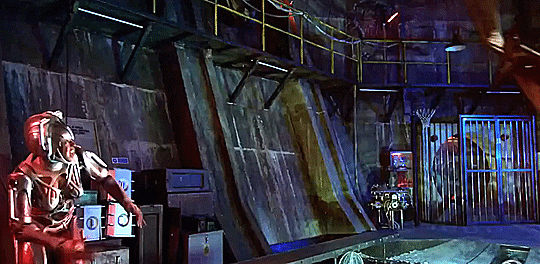
Now, Lisa Hallett...what do we actually know about her? She worked at Torchwood One, dated Ianto Jones, and loved him enough to maybe fight cyberprogramming for him - this part might be subjective to your own interpretation of “Cyberwoman.” We don’t know anything about her, really, apart from how she is defined and described for a white male main character, which...is problematic enough. I mean, would it have been too much to ask the writers for maybe some further description? I mean, I don’t know. Maybe where exactly she worked in Torchwood London? How she joined? How she met Ianto? If she had any family, any other friends? Why she loved Torchwood and worked there? Heck, a flashback scene featuring a non-cyberized Lisa and Ianto would have been brilliant. Is that too much to have asked of the Torchwood writers? I don’t know.
Then there’s the entire fact that Lisa was turned into a Cyberwoman. Now, I have many problems with how Doctor Who and Torchwood uses its Cybermen, especially regarding its continuous brutalization of black and brown bodies for emotional and shock value (Lisa, Danny Pink, and Bill Potts are only some examples.) It sends a very, very nasty message to these shows’ viewers of color, especially if they’re younger and more impressionable. Plus, the depiction of Lisa in “Cyberwoman” was uncomfortable and unnecessarily sexualized, but this is a whole different essay. But in the end, Lisa Hallett was pumped with bullets many, many times, and her death only added to the emotional pain of a white man.
Now, we come to more minor characters.
Beth Halloran was a human who did not know her true identity as an alien sleeper agent. She had a very interesting and action-packed story arc in “Sleeper” before ending up dead at the hands of Torchwood. She had an emotional struggle between her human identity and her truth as an alien sleeper and chose to help save the world, intentionally ending up dead at the hands of Torchwood. That being said, she was still another character of color who Torchwood had bothered fleshing out who ended up dead.
Next, there’s Dr. Rupesh Patanjali.
Introduced in COE, he’s a medical doctor who catches Jack and Ianto working on a case and ends up piquing their interest after he makes some shit up. Spoiler alert: he’s an MI-5 plant. We see Gwen attempt to conduct orientation and recruitment with him. He has a fun setup to be a potential new Torchwood member and inside spy, but instead, he lures Jack to the hospital where Jack’s implanted with a bomb. And despite doing his job as requested and doing it rather well, Rupesh Patanjali is shot dead by Agent Johnson that very episode, just like Beth.
Then we have Lois Habiba, arguably the most interesting and fun character introduced in COE.
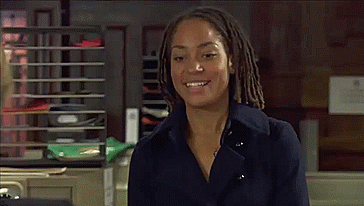
She’s a naive newcomer, almost like Gwen, but during her first week working in the Home Office, she finds herself committing treason, conspiring against her boss Frobisher, and helping save the world from an alien invasion. She’s smart, resourceful, and principled, very much like Ianto. Like with a lot of the characters on this list, we know next-to-nothing about her background, which is odd considering her rather major role in COE. And despite being seemingly set up to become a member of Torchwood, we never see her again.
Finally, we come to Miracle Day and its two new characters of color, Rex Matheson and Dr. Vera Juarez. I won’t be getting into too much detail here, especially since MD has its own problems.
Ah, Rex.

Torchwood finally has a man of color for a main character who seems like he could be an interesting foil to Jack (a high-ranking CIA agent with a high bullshit meter), and what do they do...they kill him in his first scene. Oh, and they make him “lightly” homophobic, because that’s always fun. And then he ends up immortal in some kind of bullshit plot hole...I have enough to say there.

Vera, however, was quite interesting. Again, little to no background besides the basic (from San Antonio, had an ex-husband, is a surgeon), but she was still a Latina medical doctor. She had morals and was very stubborn and determined to save people, which is why she insisted into helping Torchwood sneak into the overflow camp. And what did she get for that? She ended up brutually shot in front of her lover Rex, which traumatized them both, and then literally burnt alive. Thrown on top of that? In a quite meta move really, the death of another woman of color was used to incite outrage around the country, and the world, and expose the wrongdoings of the United States government regarding the Miracle. Good stuff? Either way, it came at the cost of the death of one strong woman of color and the further trauma of another man of color.
Plus, there’s everything about how unnecessarily violent and graphic some of the deaths of these characters of color. To put it into perspective, think about how Owen or Ianto or Esther died. (I’m not trying to reduce the values of their deaths; I’m just trying to get you to think about it.)
So yeah, that’s all I have to say about that. Torchwood, you could have done better with your characters of color. (And thank you if you stuck all this way with me.)
TLDR; Torchwood has neglected or mistreated its characters of color, given them little or no background, and brutally killed them off, often for shock value.
#torchwood#characters of color#torchwood meta#suzie costello#toshiko sato#lisa hallett#beth halloran#rupesh patanjali#rex matheson#vera juarez#children of earth#miracle day#nik wrote a literal essay
194 notes
·
View notes
Text
[Transcript] Season 3, Episode 1. Eternals Review
Welcome back to Stereo Geeks! We’re starting off Season 3 with a review of Marvel’s Eternals. This sprawling epic of a superhero film is diverse, beautiful, and just a bit overburdened by its writing.
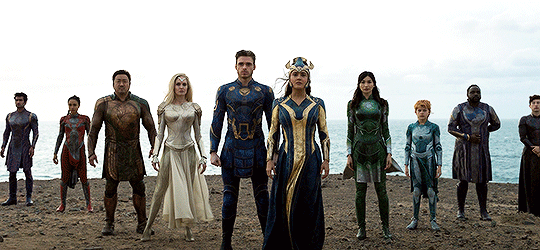
We talked about why we loved the characters, finally getting South-Asian representation in a superhero film, the queer rep (and whether it worked), and so much more.
Confused about the Eternals timeline? Here's Mon's explainer at Collider.
Eternals promo images courtesy of Disney.
Listen to the episode on Anchor.
Ron: Hello and welcome to season three of Stereo Geeks. Today we’re talking about Eternals.
Ron: I’m Ron.
Mon: And I'm Mon.
[Music]
Ron: We have had so much MCU content this year. And Eternals is just the latest in a long line of diverse content that we have been waiting for for a very, very long time.
So let's start off with what Eternals is about. The Eternals from the planet Olympia are sent by Arishem to protect Earth from Deviants, evil beings set on destruction. The Eternals have been on Earth for millennia, and they've been protecting the planet ever since. But why have they been hidden this whole time? That is what this movie essentially answers because the Eternals are extremely powerful. They're eternal. They don't die. We could have really used their help when Thanos was killing half the universe; but they had their reasons. Not good reasons, maybe. But the point is, they're here now and they're happy to save the earth. And we kind of are gonna need their help, because things are looking bad.
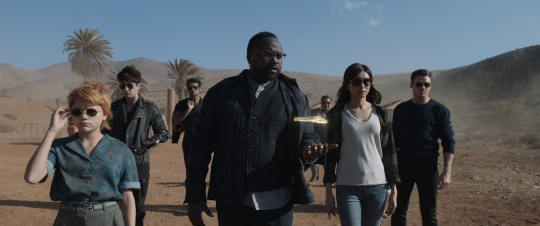
As always, we're going to divide this episode into our non-spoiler section and then spoilers. We'll talk about what worked, what didn't work in both sections.
I think what worked for us was not knowing anything. We once again managed to avoid as many trailers as possible. There was a lot of discourse because this film technically premiered two weeks before it reached regular audiences. Some people did get spoiled, but fortunately we did not. So, we went in there without any knowledge of what to expect. And honestly, that's the best way to see it because there were a lot of surprises.
This movie is 2 hours, 27 minutes long; it is the second longest film in the MCU after Endgame. I did not feel like it was that long at all.
Not everything worked. But then, that kind of goes for every MCU film. We had our own issues with certain aspects of Shang-chi and with Black Widow, but we still loved those movies. With Eternals, we came out feeling exactly the same thing. There were things that could have been better. But at the end of the day, we really enjoyed the film, and more than anything else we really liked these characters.
Mon: I think Eternals took us by surprise even before we watched this film, mostly because the majority of MCU viewers, even casual comic fans, had never even heard of these characters. So when they announced that this film was happening, these characters were going to be introduced into this world, we were really confused. But one of the things that appealed to a lot of people, certain segments not included, was the diversity that was on display.
Not only did he have a woman of color behind the scenes, Chloe Zhao, recent Oscar winner, but the cast itself was representative of many parts of the world.
Ron: So in the cast, we have Gemma Chan playing Sersi—this is the first time we've had a woman of color in the lead in an MCU film. We have Richard Madden playing Ikaris, Angelina Jolie as Thena, Salma Hayek as Ajak, Kit Harrington, who plays Dane Whitman—who is not an Eternal—Kumail Nanjiani who plays Kingo, Lia McHugh as Sprite, Brian Tyree Henry as Phastos, Lauren Ridloff as Makkari, Barry Keoghan as Druig, and Don Lee as Gilgamesh. So that's already quite a diverse cast.
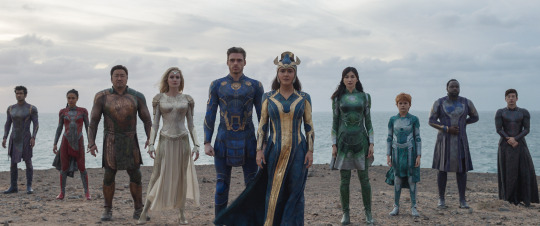
Salma Hayek and Lauren Ridloff are the first two Latin-American heroes. Lauren Ridloff is of Mexican-American and African-American heritage as well. Plus, Lauren Ridloff is the first deaf hero in the MCU. Kumail Nanjiani plays Kingo, he’s the first South Asian superhero. Brian Tyree Henry’s Phastos is the first queer hero. They had a queer character in the MCU but we don't talk about him. And we also have the first gay Muslim character in the MCU. This is Ben who is played by Haaz Sleiman. And Ben is Phastos’ husband. That's a lot of firsts. And I feel like some people thought that that was too many in one film. I think it works.
From what I read, Chloe Zhao specifically pitched this as an angle for Eternals. Because if you look at the original comics version by Jack Kirby, the Eternals are all white, mostly male. I tried reading one of them. The older comics are a bit verbose, so it wasn't really an enjoyable experience. And it wasn't for us. So coming into this, and seeing this cast was supremely exciting, and I feel like this is the right group of characters to do it with. Honestly, you can make diversity happen if you want to make diversity happen. But this is a really good start.
Mon: I completely agree. One of the things that you realize when you're watching this film is that the Eternals are a huge part of Earth's history in the MCU at least. In which case they need to look like they belong. And you can't do that with a group of 10 white folk. You need a little bit more variety.
Ron: You'll end up contrasting the Eternals with the Avengers. And the Avengers, for everything that they do, they also leave a big gap for people who don't look like the Avengers. The Eternals make you feel like you are part of this universe. It's taken a really long time for that to happen. But this is a huge plus for this film.
Mon: I agree. I don't think I would have been as interested in this film had ir not been for such a diverse cast. We would have watched it, of course, we’ve watched all the other MCU films. The interconnectedness of the MCU also means that you don't really have much of a choice. But the enthusiasm comes from the fact that there is a lot of inclusivity, and I think for us to be arguing about this much diversity in a film that is in a franchise, which is older than a decade is ridiculous.
Ron: Yeah, I don't think we need to care about the people who have a problem with the diversity in this film because as we said, that is a really positive thing. I feel like it actually lends a lot of gravitas to the characters’ relationship with the audience.
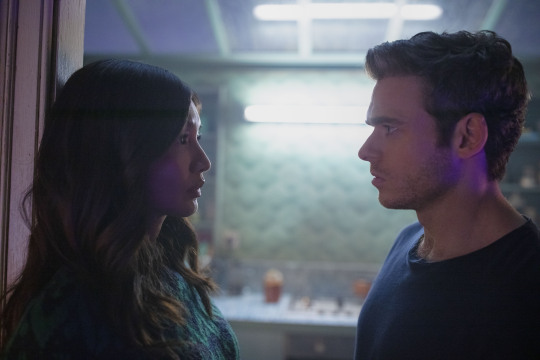
Mon: I agree, and also to the story. Because it's not just the diversity of the characters. It's the way they enmesh themselves in the cultures, which we won't go into too much right now. But it is a very valuable part of their story. And I don't think we would have cared much for them or even understood some of their motivations if they were always looking in from the outside.
Ron: And one of the main things that really sold this film for me was the characters and not just the diversity but the characters themselves. 10 characters is a lot and the Avengers films would often struggle just with the six that they had. Thor really got left behind, you guys. And I'm not saying that that doesn't happen in Eternals. But each character has such a distinct personality and very distinctive relationships with each other. Whatever you think about the film, the story, whatever, when you come out of it, you're still thinking about the people that you've been watching. And that's probably why I have a much more positive view of this film than a lot of people because I came away having fallen in love with 10 new characters. That's a great feeling.
Mon: I agree. When we went into watch this film there were a lot of snippets and trailers. And there were some BTS bits where Kumail Nanjiani was basically saying, ‘oh, each of these characters is very distinctive’ and when we watched watched the film, we were like, yes, you know, he's not talking out of his hat. He means it because they really are. They are so unique. You can't mix them up. They not only look unique, they act unique. Their personalities, their motivations, their reactions, all distinct, all different. And I guess you could say it really is a Chloe Zhao sort of thing, because she does make you want to be invested in these characters. And she's able to be make them very grounded even though, well, they’re immortals, they're super powered, they come from a planet called Olympia. Really, we should not be connecting with these people, but we do, because there's this earthiness to who they are. I really enjoyed that.
And I think the flaws of this film, as grave as they may be, they would be highlighted even further if the characters weren’t this strong.
Ron: Yeah. And they're all connected to each other in different ways. Which is quite a feat honestly, because 10 people, 10 different combinations, but it still works.
Mon: The dynamics are very interesting actually. Because you do learn different things about the dynamics between different characters. And you understand why people are behaving in the particular ways that they are. And it unfolds slowly in some aspects. I would say that they rushed some bits and they didn't in other bits.
But she put in these little snippets and these shots from time to time and you're like, ‘Oh, look at the way this person is watching his colleague;. And that leads into something essential in that character's story arc. I really love those bits.
Ron: There's a lot of information that is dumped on you. From the very opening moment right to the end. It's words and worlds and powers and abilities. It's so much.
Mon: That opening scroll went on for five or six paragraphs?
Ron: Yeah, it did.
Mon: And they mentioned all these names and titles which are completely unfamiliar to us. Okay, you know, you really need to take this very seriously because she's giving you information which is important to the actual film. I got that Star Wars-y feel.
Ron: Yes.
Mon: And it made me kind of nostalgic because I think we’ve gotten out of the habit of getting this information, which is very key because nowadays, films are just structured differently. So it's kind of nice.
Ron: But at no point did I feel like there was so much information that I couldn't understand what was going on. I was actually surprised by how much information I actually retained, which was interesting because this is all new. But what I liked about the way Zhao did it, she leaves it to the audience to figure things out. She's not signposting how a character feels. She gives you a moment to see how they're looking at something or how they looking at each other or how they're reacting to something. When something is said. You decide what that means. I thought it was really intelligent. And it's not something you expect from superhero films or superhero television because they're constantly reiterating things. With this film. Despite the new characters, new kind of world building, all these new concepts, you're just kind of left to understand things, which is good. I liked that.
But there's also like this richness to the tapestry of the film. They go to so many different locations. They speak so many languages. I remember when we first saw Iron Man, and the bad guys who had taken Tony, they were speaking in Urdu, and we were like, ‘Okay, so this is their plan’. Obviously the characters didn't know that. So we all knew what to expect, but Tony didn't. It just was like, what is going on.
But this film does not do that. These guys are Eternals and they've been around for a long time. They're able to absorb the cultures and the languages that they live amongst. And what I really liked is yes, they're speaking these languages, but they're also reacting in a way where you know that they understand it. And that's not just the past, but also in the present. It felt like these people belonged on Earth—
Mon: —or they wanted to belong.
Ron: That's a good point.
Mon: And I think it's really important. We want to reiterate the fact that the use of so many languages is quite unusual in the MCU, especially among main characters. It's getting there a little bit, but you really feel it in this film because they weave those different languages into their speech from time to time, and some of them are good at it. Some of them not so good. But they're all trying.
Ron: So for us, another thing that really captured our imagination was the fact that we have a South Asian superhero, and there were actually South Asian elements, which was unexpected.
Mon: A lot of times what happens is people talk about diversity, but diversity is just skin deep. What you really need is representation and you need inclusivity. It isn't perfect. I'm not saying that Marvel has now ticked every inclusive and representative box, but they really went far beyond what we expected. We thought South Asia hero, okay. He just looks like us. But it goes beyond that. And I really really enjoyed that aspect of it. I mean, especially it was fun for you and me. We’ve always loved superheroes and we've never really seen that kind of representation in the kinds of movies that like to see, so we are a step closer.
Ron: I never imagined hearing Hindi spoken properly in an MCU film. Bruce Banner spoke some Hindi in the first Avengers movie, but we can't count that because it was terrible.
Mon: Also, it was in Kolkata. Why wouldn’t he speak in Bengali? My brain hurts.
Ron: We also had the first queer family and queer kiss, which has got Eternals banned in some countries. It's not a huge thing.
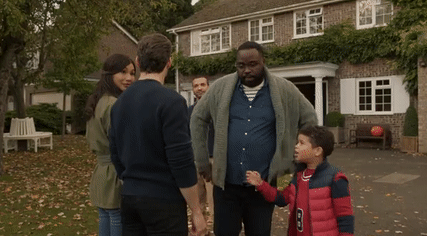
Mon: It isn't. It's one of those quintessential Disney/Marvel moments where you can easily chop it out
Ron: Yes. And I think that's why they make it like that, so that they can actually cut that scene and send it to countries where, apparently, people will have a problem with it. But what I liked is that it's not just one kiss and that's it. Phastos and Ben, their relationship is extremely key to Phastos’ every motivation. So that's why I think some of the countries actually banned it, because they realized they can't cut all those bits, because Phastos is really important. I’m kind of glad that they leaned into it. It's a step in the right direction.
When you look at the DC CW shows, for those shows, representation has gone way, way beyond—queerness is just part of the fabric now. The MCU has a very long way to go. But Phastos and Ben is a good start.
Aside from all the other things that we really loved about it, this is such a gorgeous movie. Yes, there are bits set in space, obviously, so those are beautiful. But Earth itself—I feel like this movie really loves Earth. And in a way it does, because it's showing us a very different kind of perspective. Most of the Avengers are from Earth, they obviously they care about it. But the Eternals, they're not from here, so they have a very different perspective. It's a very loving perspective. And I guess that's why the movie looks as beautiful as it does, because that actually ends up being a motivation for some of the events.
Mon: Well, Chloe Zhao does have a habit of bringing out the beauty in the ugly. Even in some of the more desolate or barren areas of the planet that we visit in this film, she shoots it with such great grace and beauty. It showcases the grandeur of the planet. I really liked that.
The Eternals, they're part of this fabric, and again you see this sprawling landscape behind them. You feel why they're so connected. And there's so many locations.
Ron: Yeah.
Mon: It's amazing. You really see a lot of Earth over here.
Ron: So those are the reasons why we loved this film.
There were certain things that didn't work, chief among them being the exposition. There is a lot of exposition in this movie. I think it's basically that one scene where a lot of exposition is shared with us in a very short amount of time.
Mon: It's also exposition about three to four different plot points, which I still feel could have been scattered throughout the story or even pushed to a second film.
Ron: I was feeling same thing.
Mon: Because I feel like there were some twists in that exposition, which would have really led to a good cliff-hanger and prolonged the story of these characters. And I could just be saying that because I'm biased and I love these characters and I want to see more of them.
Ron: Yeah.
Mon: They have some really interesting chemistry between them, even though not a lot of them spent that much screen time together. But you feel that connection.
Anyway, back to the exposition. See, we keep going back to the characters.
It was very obviously the Marvel formula pushing its way through and because so much of the film is taken out by character building, character development, and understanding who these people are, so all the exposition sort of got squeezed into this one scene.
Ron: Having said that, maybe it’s because I’m biased, but to me, when I was watching that, I was like, ‘oh gosh, this is a lot of exposition’. But on the other hand, I was thinking for the character, it's a bombardment of information that shocks her. So, she goes from ‘being okay, this is what I have to do’ to ‘oh my gosh, this is what I have to do’. I felt like that may have been the point of that very, very long scene that she is just bombarded with all this awful stuff. And she really is reeling. So, we are also supposed to feel like that. But, instead we kind of came away feeling like ‘oh, this is exposition’.
Mon: I agree. We are reeling and we understand that she's reeling as well. But I still feel that at least one of those plot points would have been better served had it been saved for later.
Ron: And there's a scene later on when you get one of those plot points explained anyway. So maybe that could have been left out.
Mon: Yeah. I just wonder if there were a couple of twists in that exposition, whether it would have really made a much more powerful film had they actually learned it organically. But it would have been a very different story.
Ron: Yes.
Mon: That may not have been what Chloe Zhao wanted to write. That’s the reason they went the way they did. It's just that, honestly, everybody's talking about it now and just ignoring all the good parts.
Ron: But the thing is that the MCU fans have often struggled with exposition. Well look at Age of Ultron, there was just so much talking.
So, one of the other things that I really struggled with was Sersi is technically the lead, but I felt like there were times the film was favoring Ikaris. He was definitely a very interesting character. But I don’t want that.
Mon: I honestly didn't realize that Sersi was the lead till partway through.
Ron: Oh!
Mon: I really thought it was Ikaris. And then he disappears and you suddenly start getting Sersi’s point of view outside of Ikaris, which is when I realized ‘okay, so it’s Sersi’. It took me a while though. I really thought it was Ikaris. And Richard Madden has also been the most prominently featured and promoted actor for this film.
Ron: I'm glad that Sersi was the lead. It just felt like Ikaris was constantly stealing the limelight from her. There is a reason why—everything that happens has an explanation. It's just a little bit frustrating.
Mon: Yeah, I think there was a lot of focus on Sersi and Ikaris’ characters. When you have an ensemble cast and you have touted it as an ensemble—you have your posters very prominently featuring all 10 of them—you do expect there to be some equity in the screen time. And we didn't get that, and I think that was my biggest grouse of this film. I really wanted more of these other characters.
Ron: Salma Hayek is Salma Hayek, so whenever she's on screen, you can't miss Ajak. But I felt like she just wasn't there as much as we wanted her to be. I also wanted to get into her head a bit more. I think we managed to get an understanding of all the other characters but Ajak not so much.
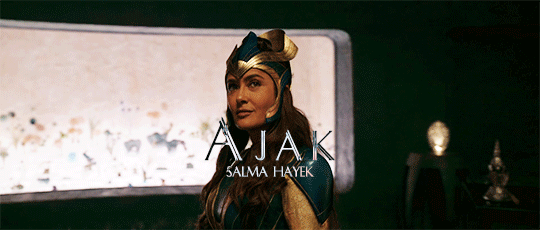
Kingo, Phastos and Gilgamesh, they did not get enough screen time. I was upset.
Mon: Same. They are all the very interesting characters. Kingo, still, I have to say he got more screen time than I expected. But Phastos—especially when you have somebody who is such a known name like Brian Tyree Henry—you expect him to pretty much be in every scene. But I don't know; I can see that this is a pattern.
Ron: Yes.
Mon: Every time he's in a film, he's hardly in it. Whenever he's on screen, he steals the show.
Ron: Yeah.
Mon: What is everybody afraid of? Just let him steal the show, people.
Ron: I feel like Makkari was gone for like ages. But then once she returned to the screen, she managed to own it, which was a good thing because she was great. But it definitely felt like there were certain characters that were getting more of the screen time than others.
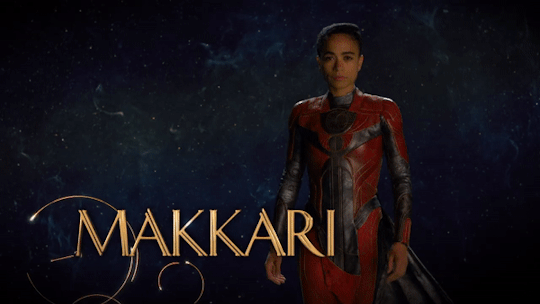
Mon: Not only screen time, but development to understand who they are and what they’re doing. We could intuit a lot about the other characters, but I feel like we really wanted to spend time with them.
I completely understand that juggling 10 characters is a lot. But when you do, have a think about where you want to take these characters; what do you want to do with them?
Ron: Less screen time for Ikaris.
Mon: He was an interesting character, though.
Ron: He was an interesting character but he was kinda like, you know, Broody Superman and I was just like, I'd really rather hang out with Phastos.
Ron: I think our last point is probably the soundtrack by Ramin Djawadi. The MCU scores have been very up and down. Sometimes you get really good ones—like The Winter Soldier was really great, Black Panther was amazing. Shang-Chi has been great.
This one, the Eternals theme, I've quite enjoyed that. It's different. It feels very orchestral, very bold, yet also very space-y. But the rest of the music, not so much.
Mon: Yeah, the rest of the music I won't say it’s generic as much as it is just unmemorable. It's a bit same-y.
Ron: It also fades into the background way too easily. Like you don't even realize that there's music.
Mon: Yes, I don't like scores like that. Every piece of music should have some kind of movement to it.
Ron: And especially when you've got a bunch of characters like this.
Mon: Exactly. And a film that is full of action. And we don't mean necessarily action scenes, but action in the way that how the people have to react, and work and find out things. There's something happening in every scene. The score really doesn't reflect that.
Ron: You know what I would have loved? Themes for each of the characters.
Mon: Yes!
Ron: This film was ripe for it!
Mon: Double the runtime of the soundtrack with themes for every character.
Ron: Yes.
Mon: Wow.
Ron: They really missed the boat there.
Mon: They did.
Ron: Unfortunate.
Ron: So, I think we're ready to go into our spoilers section. If you haven't watched the film, stop the podcast now, go watch the film, and come back.
So, spoilers. Those locations. Outstanding! But the one that really stole our hearts, Babylon.
Mon: Yeah, we see them fighting, kinda in close-up and you can see the blue gates behind them, but then it zooms out. And it really showcases the grandeur of these beautiful blue gates. Wow! It really made you want to go back into the past.
Ron: I know! That's what I really loved about the past scenes in this film. It has such a reverence for the history that we had. And you can understand why because the Eternals lived through all that and they wanted to preserve it. It was just so beautiful, and I honestly felt like I preferred the scenes in the past more than I liked the ones in the present. It also helped that in the past they were all together. So, that was a plus point.
There were so many twists and turns and I can understand why people who were spoiled before the movie came out would have been really upset. Because if I had known any of those points, I would have been really angry. Like Arishem lying throughout their entire time on Earth. Who expected that to happen? And the fact that Ajak knew the whole time, but obviously she kept it secret because then her people would not be finishing their mission. And Ikaris being the baddie. I totally called it!
Mon: I didn't…
Ron: You didn't believe me.
Mon: I did not believe you. I thought to myself, this is the main white guy on the team. There is no way he's the bad guy. He turned out to be the bad guy. I also have to say it's such great direction on Zhao’s part that Ikaris is so stoic when he returns to Earth in the present day. He’s stoic, he doesn't react much and throughout I kept thinking why is this guy not reacting like the others? You know, Ajak’s death, the Deviants having healing powers and sucking up Eternal’s powers. He just seemed to be unfazed, not even nonchalant, just unfazed. And it doesn't make sense till the big revelation that he's the villain. And honestly, that's great direction.
Ron: Yeah, because there’s no reason for you to think that somebody like Ikaris would be betraying his team. And then he actually gets help. Sprite, who’s a very interesting character, not like anything I would expect to see, definitely not in the MCU. But sprite who was like, you know, been with Sersi throughout, was so fond of Kingo, and the two of them used to hang out together for so long. And then she's just like, the moment Ikaris steps out, she wants to join him. And I was like, What? Why? But obviously, even those moments are foreshadowed but it is still a bit of a shock.
What did strike me as really surprising was Kingo sitting out that battle.
Mon: Uh-huh.
Ron: Because he actually was on Ikaris’ side, but he didn't want to fight. Obviously, he didn't want to fight the other Eternals. That was a really interesting thing to happen.
Mon: Yeah, I'm not a big fan of that.
Ron: I'm also not. I would’ve loved for Kingo to be there.
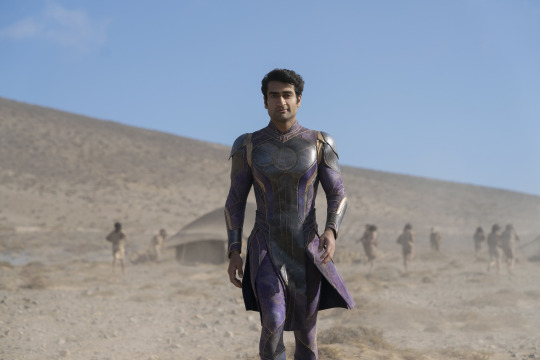
Mon: I think Kingo would have been a little too powerful. That is probably why he was written out of the final battle.
Ron: Yeah, but it was just such an unexpected thing to happen. Like, for one of the core members to just say, No, I'm not going to fight at all. Y'all deal with this.
Mon: Yeah, it's interesting because I felt like everybody else sort of worked and their motivations made sense. But Kingo specifically sitting out that battle and siding with Ikaris and the mission, that was the only time I felt that this is completely out of character. I just didn't see him as the kind of person who would not love Earth, not love what he's done or achieved, or that he’d let himself die. Which is what would happen in the case of an Emergence.
Ron: But I think with Kingo it wasn't that he didn't love Earth. He does. But he believed in their mission. And the fact that if they stopped the Emergence, they would actually prevent the births of other worlds and other people.
Mon: So, it was the big sacrifice play for him?
Ron: So, he was basically sacrificing his own ideals for his team. Whereas Ikaris was being very belligerent about it. He was ready to fight the people that were his family, because, well, it's a bit of an ego thing really. Kingo kept his ego out of it.
Mon: You know, you put a really good perspective on that.
Ron: Thank you. And everything about Kingo was just like, brilliant though. And him having the valet. so Karun, who is played by Harish Patel, who we have been watching in films since we were kids and it was just like so random to see him in Eternals. We were like, what?
What I really loved is he was there throughout. Every time that Kingo was around, Karun was not far behind. That man had an unending supply of cameras. They were really funny. And I really love that part. Because otherwise I think this movie could have got really, really heavy. Sprite had some funny moments. Dane had some funny moments. But Kingo and Karun were just like, they stole the show for me.
The whole South Asian thing. We touched on it a little in the non-spoilers section, but it was just so surprising. And you know what this is what they talk about when they say representation. We’ve never seen people like us on a big-screen superhero film. Finally we’re getting that. I think that's also why I kind of felt a little bit bad that Kingo wasn’t there in the final battle. But also, you know what, he took the Black Panther way, so I'm not complaining. I like the fact that we got to see the Gupta period.
Mon: Yes, which is the Golden Age of India. And again, we see some really good writing because that's the one period in the past when the Eternals are in a celebratory mood, they are only enjoying themselves. There’s no war, there's no fighting. Whereas in most of the other periods, they are in the middle of some battle. If they're not battling the Deviants, they're witnessing horrifying invasions. But that was a celebratory period.
And again, clever writing, just knowing a little bit of history. It's actually the third line in Wikipedia. It's not that hard. But still, it was a smart move. So, it may you feel better. Because had they gone to the Gupta period, and then you see everybody fighting and warring. We’re not saying there weren’t any fights and wars, we’re just saying it was a very peaceful time.
And that wasn't it. Well, Kingo is a Bollywood star, so there's an item number. [laughs] And the fact that Karun speaks a lot of Hindi throughout.
Ron: And Kingo speaks Hindi, as well.
Mon: Yes, very briefly. And the Bollywood posters depicting just how different the eras are. That was very true to life, and a very good touch. And the most touching line in the entire film is something that Karun says in Hindi. It was just a genius move.
Ron: And you know what I really loved is that when he's saying that, and you know, we understand Hindi, so we understood exactly how much sentiment was going into that, but you get these reaction shots of the Eternals. And none of them would actually know Hindi, but the Eternals do, and they react just the way you would expect. I really loved that. Those are really, really nice moments.
Mon: Yeah, it's the reaction shots that really sold this movie for me. Like there's this time when Sprite is creating these illusions, telling the story of how Gilgamesh and the others fought this war and won and Kingo is mesmerized. And he later says, it's the way you used to tell stories that made me fall in love with storytelling, and that's how I went into Bollywood. And I just thought, it's those character moments that honestly, they’re the best part of this film.
Ron: I could watch a whole trilogy just on these 10 characters.
Mon: Same!
Ron: And that's kind of what hurts because a Ajak is gone. Gilgamesh is gone. Ikaris is gone.
Mon: Sprite lost her powers.
Ron: So, technically she's gone. I feel like sequels could possibly have flashbacks. They were on Earth for 7000 years. We can go back to the past, but it's not going to be the same.
Mon: Yeah, I agree. Part of me keeps thinking Arishem is still there, the worldforge is still there. He can just create new versions. I'm just looking for loopholes to bring these characters back. Because let’s be honest, Ajak in the comics is a male character, which, when you read the name, you think it's a male character. And it turns out to be Salma Hayek, who has these healing powers and is this benevolent leader who knows so much. And you can see the burden of knowing that you've been part of the destruction of planets for millions of years.
Again, that's foreshadowed with acting. And then you find out the truth later. So you meet this character who is so incredible and then she doesn't last long.
Ron: Yeah.
Mon: I hate that. And then there’s Gilgamesh who throughout has got these little sneaky glances and moments with Thena and you can just tell there's something going on between these two. They never put a label on it, which is fine, but you can obviously tell that there is something very special because when she is struggling with Mahd Wy'ry, which is a psychological disorder that some Eternals face, he immediately decides to put his entire life on hold so he can take care of her. And then later on, Thena says to Sersi’ that Gilgamesh always said that you'll do anything to protect the people you love. So, all this development, this relationship, this dynamic, it's sort of built through these little sentences here and there, little glances and things that they do, and then they killed him off.
Ron: I know!
Mon: And he was so funny!
Ron: Gilgamesh was funny, and he was so sweet and he and Thena were just adorable. Obviously, the focus was on Ikaris and Sersi’s romance, but this unexpected little connection between Thena and Gilgamesh was just so sweet to watch. And it was kind of effortless. Like the characters obviously have a relationship but the actors just had this chemistry that was just there, like from the very first fight scene. And I was like, hang on, is there something happening? And yeah, it's there. They just haven't done anything with it. So, when Gilgamesh is gone, you feel that not just because we like Gilgamesh, but you feel that because Thena has lost Gilgamesh.
I was so surprised because you have a name like Angelina Jolie, and I was just like how is this movie going to not be Angelina Jolie's movie? I don't know how they did it, but she's just one of the Eternals. She has really cool powers, I really liked them. But she's also very kind, very lost. She gets vindicated for what she feels so that's a relief because I was like, why are they doing this? Why is she feeling the effects of Mahd Wy'ry so badly? But fortunately, there is a reason why. But she has these amazing action moments that are really fun to watch. And you kind of forget that you're watching Angelina Jolie.
Mon: I appreciated that. I was very concerned, just like you, because Marvel has a lot of big names. Not gonna say that they don't know.
Ron: Umm. Marvel has kind of made the big names, though.
Mon: Well, you also have people like Anthony Hopkins, so, I'm just saying.
Ron: That's true.
Mon: It would have been easy for them to just make it a Jolie-vehicle. Let everybody else just coast. She could have phoned it in. Thankfully, she didn't. She also didn’t chew the scenery or gobble up all the screen time and presence from everybody else. I really appreciated that.
Ron: Yeah. Apparently, Jolie was surprised by how large the role was.
Mon: Okay.
Ron: She was expecting something much smaller. So, she worked really hard on those action scenes because she wanted Thena to have her own movement. And that's definitely something that you see, that all the characters have a very different kind of physical presence. They all hold themselves very differently. And that's probably the workouts and everything that they had to do. Everybody knows Kumail Nanjiani transformed himself for this film. Richard Madden, as well, had to do the same thing. They apparently spent a lot of time in the gym together. But like Don Lee, he's an actual fighter.
Mon: Oh?
Ron: So, his way of holding himself, very different.
Mon: Yeah, and his movements come across as somebody who has that kind of skill.
Ron: Yes.
Mon: Oh, very interesting. I didn’t know that.
Ron: Yeah. So, I really liked the fact that they're distinctive in so many different kinds of ways. See how we come back to talking about the characters again?
Mon: So, let's talk about something that was signposted in all the pictures, all the trailers, which was the Sersi-Ikaris romance. So, let’s talk about that a little bit. We knew it was going to happen when we went in because the pictures were unavoidable. And they’re the first two Eternals to wake up, they look at each other, they’re making goo-goo eyes from the moment they see each other. And we’re all like, okay, we get it.
Ron: But their romance actually takes a long time to actually start.
Mon: Yes.
Ron: In film time, it's not that much but they both prioritize fighting the Deviants over actually being -together. But from the perspective of a 2 hour 37 minute-film, their romance was super-rushed. And you can understand why. Because the film kind of hinges on the fact that these two have already been together a very long time. They've already kind of tried to move on from each other because Ikaris decided to disappear. But they’ve come together under these extremely difficult circumstances. And then of course, you have Ikaris’ betrayal and everything. So, those are really important aspects of the film. So, the romance is sped up.
Mon: I found that really strange because they start making goo-goo eyes in 5000 BC, and it's only in 525 BC, when they're in Babylon. Yeah, when Ajak tells Ikaris, go get a life. Tell her how you feel. And then it's like boom-boom-boom. He is following Sersi see around like a little puppy dog. And then next thing you know, they're together and they're getting married. Did it have to be that fast? Couldn’t we have had some breaks in between?
Ron: This is why this movie should have been three movies.
Mon: True, true, I agree with you.
Ron: I'm very intrigued to see what they'll do with the sequels because so much happened in this film. I think one of the other things is that Sersi and Ikaris are very beautiful, but they have very little chemistry.
Mon: I thought so too.
Ron: And I can't understand why.
Mon: Yeah.
Ron: Sersi had more chemistry with Dane.
Mon: She did.
Ron: I feel so bad for saying that.
Mon: Even though, poor Dane had like two and a half scenes, but they did have a lot of chemistry. This is the problem with Marvel. They know that they need to have a romantic pairing, but they don't put in the work to make it a convincing pairing. You can like the characters, you can like the romance and you can still say, where’s the chemistry. It can be so dull.
Ron: Like Thena and Gilgamesh, they work. Makkari and Druig kind of have something going on.
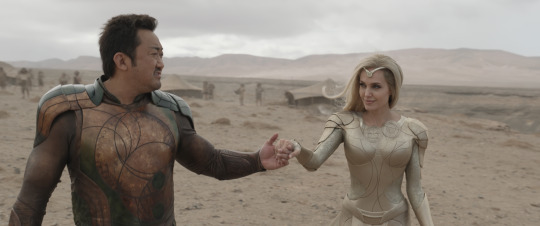
Mon: I don't get those two.
Ron: I don't get it either. Their own family don't. But they also work.
Mon: Yeah, I felt like they had some kind of strange chemistry going on between them.
Ron: Yeah, they were constantly like flirting, from way back when.
Mon: Exactly.
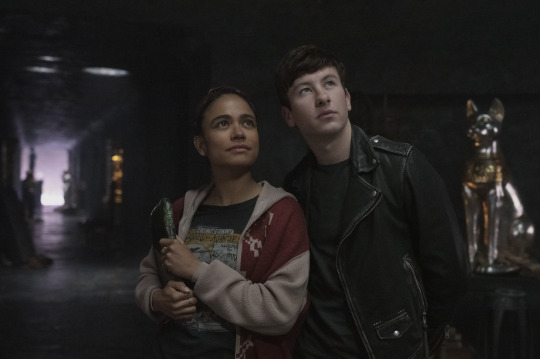
Ron: But Sersi and Ikaris, I just could not get on board with it.
Mon: I agree.
Ron: So, shall we talk about the end of the film and those post-credit scenes?
Mon: Yes, absolutely.
Ron: So, the end of the film… Now, you think that it's going to be the climax where they stopped the Emergence. Ikaris dies. They have to see what to do next. So, Thena, Makkari and Druig take the Domo, their ship, and they leave Earth. Which is sad. But Sersi, Kingo, and Phastos, obviously, they stay back on Earth. They're just about to restart their lives and they get pinched by Arishem, who's like, let's see if Earth is really worthy of being saved like this. And I’m like, what, where did you come from?
Because, all this while, Arishem has only been contacted through the sphere that goes into the leader of the Eternals’ body. And it turns out he's just been hanging out here somewhere this whole time. So, that's a really unexpected cliffhanger ending.
But then you have the end-credits. So, there are two end-credits. In the first one, we’re on the Domo. The three Eternals are very concerned that they can't get in touch with the rest of the Eternals on Earth. Suddenly, there's this portal and Pip the Troll appears. And I'm just like, this is a terrible end-credits scene.
Mon: Exactly. I saw that and I was like, this is so underwhelming. Who is this guy?
Ron: It turns out that he’s the herald for Eros/ Starfox. The brother of Thanos. Interesting thing that we learned, Thanos was part-deviant. Who knew? It turns out that Starfox is played by Harry Styles. So, the three girls behind us were losing their mind. And you and I were looking at this guy on the screen like, who is this?
Mon: In our defense, the screen was a little bit dark. He looks very different.
Ron: He does. He looks extremely different as Starfox. He looks very nice, in case people get worried. He looks very nice, but he looks very different. And also we have not seen him in ages.
Mon: Yes, it was very confusing.
Ron: We were very confused. And we realized what was happening. The three girls behind us screaming definitely helped.
Mon: Exactly.
Ron: Apparently, they had mentioned that Starfox was going to play by Harry Styles. This information goes into my head and goes out; there's too much in there.
Mon: This is why you should have a busy life. Then spoilers come and go.
Ron: But it's interesting because Thanos was Thanos. Is Starfox going to be like that? I don't know what the point of him is. I don't know why he's on the Domo. Is he going to join the Eternals? Nobody knows. It's all going to be very interesting. But you know what, new characters. I love it!
Then we have the second end-credits scene. This one was very confusing for me. I didn't know anything that was going on. So, we have Dane. He kind of tells Sersi, just before Arishem abducts her, that he has an interesting family history that he hasn't told her about. In the second end-credits scene, he's got this blade, and he's very uncomfortable about actually opening the box and actually holding it. And then there's this voice that says, are you sure you want to do that? So, we had no idea what was happening.
Mon: Yeah. The box even had this very ominous saying: death is the only reward.
Ron: And I was like, is this from The Mummy.
Mon: Exactly! After reading that, I wouldn’t pick up that creepy looking sword either.
Ron: I know. It didn't look great. So, we kept wondering who the voice was. I was sure that it was Dr Strange. The girls behind me, who had stopped screaming finally, they thought it was Nick Fury.
Mon: Eventually, Chloé Zhao has revealed who the voice is. And it is Blade, played by Mahershala Ali.
Ron: I did not expect the vampire connection to come into Eternals but hey, I’ll take it. Again, new characters. I’m all for it.
Mon: I feel like this phase of the MCU is going to lead us to crossovers galore.
Ron: I would love that.
Mon: Exactly.
Ron: I've always loved crossovers. Marvel team-ups are the best. This is a great idea.
Mon: They should just do it.
Ron: I mean, we know that Dr Strange is going to have Wanda in it. We know that Dr Strange is going to be in the next Spidey movie. Team-ups. Let’s go with it!
Mon: Exactly. Vampires and Eternals. Hey, let's do it. Well, Dane in the comics is a character called Black Knight…
Ron: Oh…
Mon: Who wields the Ebony Blade.
Ron: Wait, Black Knight is supposed to be a movie on the MCU roster, so I guess he's gonna be…
Mon: Oh! I didn't even know it was going to be a movie on the roster.
Ron: Somebody who is writing or producing this film is working on Black Knight.
Mon: Okay, well, wow. He's gonna star in his own film.
Ron: I think that explains why there are so many writers on this film, because some of those writers are writing other films.
Mon: Okay. That makes sense.
Ron: So, they had to kind of come in here and just tie it in. I'm not sure how I feel about that.
Mon: I'm not sure either. Do I really want an entire movie about Dane?
Ron: Let's see what happens. It's the MCU. There are going to movies that work and others that don't quite work but you still enjoy them.
Mon: And some movies that will surprise us, like this one. I was really worried about it.
Ron: I was not sure what to think about it because I didn't know anything about these people. We had really enjoyed Chloé Zhao’s Nomadland. We were very excited by the fact that there was a woman of colour who was directing it and writing it.
You get aspects of that in this film, the diversity of the cast for one. You get so many different eras, so many different locations, so many different languages. You get cultures that are not just the same American culture all the time. I think that's huge win. We really needed this. It's not perfect. There is a lot of exposition. Some of the characters got shunted to the wayside. The romance in the middle was not so great. But it kind of dared to do a few bold things. And those bits really did work. And you got a South-Asian hero. I am really happy about that.
But, yeah, I really enjoyed it. If you've caught Eternals? What did you think about it? Let us know.
Ron: You can find us on Twitter @Stereo_Geeks. Or send us an email [email protected]. We hope you enjoyed this episode. And see you next week!
Mon: The Stereo Geeks logo was created using Canva. The music for our podcast comes courtesy Audionautix.
[Continuum by Audionautix plays]
Transcription by Otter.ai, Ron, and Mon.
#eternals#marvel#MCU#sersi#ikaris#ajak#makkari#druig#phastos#sprite#gilgamesh#thena#kingo#gemma chan#richard madden#salma hayek#lauren ridloff#barry keoghan#brian tyree henry#lia mchugh#don lee#angelina jolie#Chloe Zhao#mcu phase 4#kit harrington
3 notes
·
View notes
Text
thoughts on (netflix's) shadow and bone from someone who's never read the books but has absorbed peripheral information from tumblr. spoiler warning(?)
overall pretty solid!
they failed to make me care about alina though. i was much more invested in the crows' storyline even though they achieved nothing they set out to do and won anyway, which is always my favorite type of plot
i know that malina vs darklina is a Very Important Debate in the grishaverse community so here's my opinions on it: the age gap definitely has a very weird vibe but mal has basically no personality aside from simping for alina so we ship darklina for the juicy dynamic and malina for the healthy childhood friends to lovers content
there's usually One Ship i center myself around for every fandom and for the grishaverse i've decided to dedicate myself to kanej
SPEAKING OF KANEJ. finally some good south asian (specifically desi) representation! i can't tell you how much it means to me. of course alina and mal are important too but INEJ MY QUEEN!
i can't comment on the queer rep because it's not my place but they pulled it off pretty casually - it didn't feel forced to me so +1 point
i can't decide if freddy carter's good-looking or not. what's going on with his face fam
they didn't do a very good job with properly showing the passage of time. logically i know it must've been at least a few months based on how many letters alina and mal sent but it felt like a few days ngl. it needed more episodes or longer episodes, just more room to breathe in general. i wouldn't have minded if they cut nina and matthias out entirely ngl
now for thoughts on each character individually!
like i said i didn't really care about alina? idk she has very generic protagonist vibes and she gave up mal pretty quickly for someone whose last sight of him was him hobbling after her screaming her name lol. also she was pretty reluctant to destroy the fold for someone whose parents it killed? it feels like they were going for the 'cinnamon roll who could kill you' vibe but since that's the personality of Every Female YA Protagonist Ever they failed to add that touch that would give her her own personality
mal! like i said, no personality aside from simping for alina. unrelatable, but his determination is sweet. they really romanticized his tracker abilities, didn't they? he managed to find the legendary stag no one had been able to find for hundreds of years What
i will now be simping for inej forever, thanks. queen. legend. her hair is literally so pretty
kaz… truly an exasperated dad. i love him. exactly my brand of Angsty Traumatized White Boy. beat the crusty old darkling with a magic trick. an icon
genya! ngl i wouldn't've been too pressed if she'd been the main character - someone so consumed by rightful revenge they're willing to hurt the people they care about to get it? overdone but still spicy with an added newness of rape survivors finally getting some healthy representation
jesper. a queer king. he and mal fight for custody of milo sometime off screen i don't CARE it wouldn't fit in universe that's what happened
zoya. her redemption felt a little rushed to me; like i said, they needed more time for stuff like this
matthias. we love a redemption and then nina accidentally destroying all that hard work lol
nina! queen! apparently she was supposed to be plus-sized though and that would've been very important so >:( to them cutting that. we love her changing matthias's mind on grisha by just being herself and then undoing that by also being herself
the darkling! mixed feelings. on the one hand he's an old man creeping on someone who barely looks legal on the other hand he's v pretty and his motives are very grey
and those are my thoughts on shadow and bone! i'll definitely be reading it but apparently six of crows is better so i won't get my hopes up (i even heard some saying the show was better)
6 notes
·
View notes